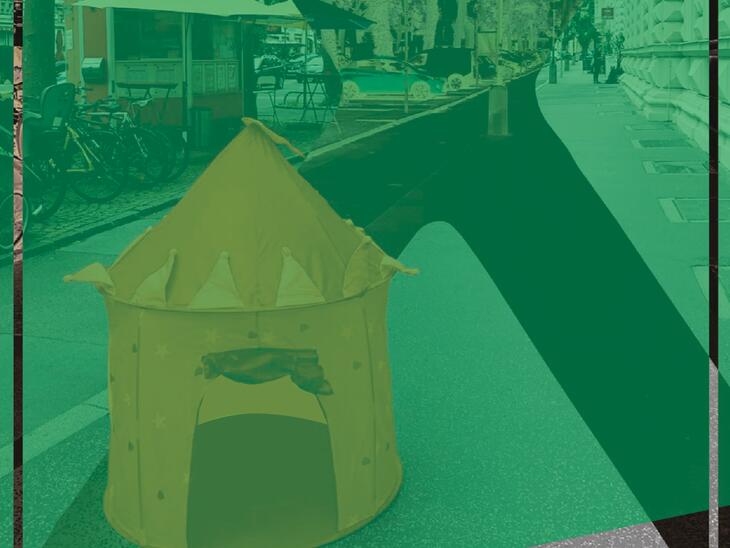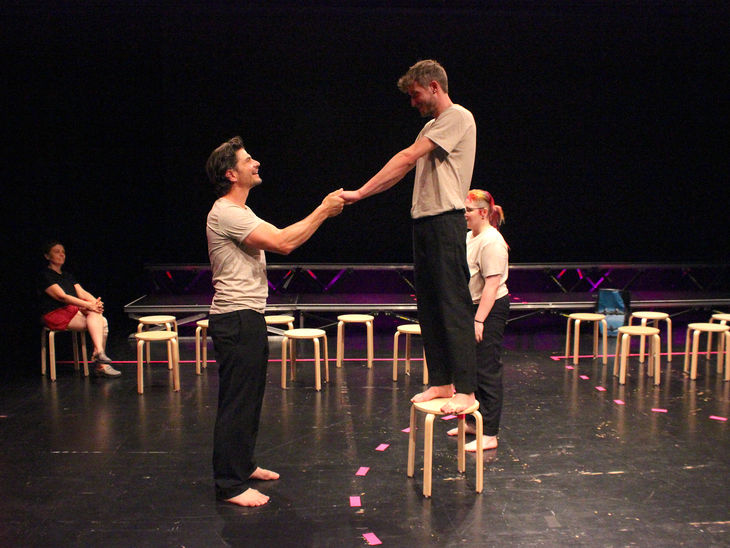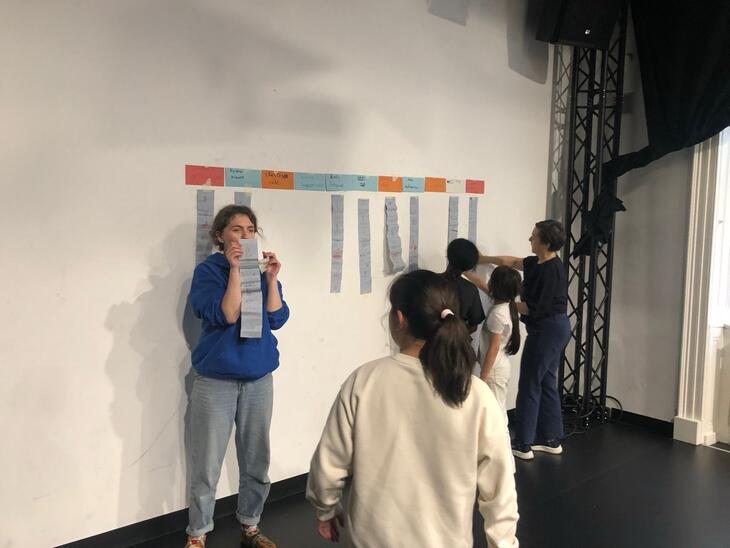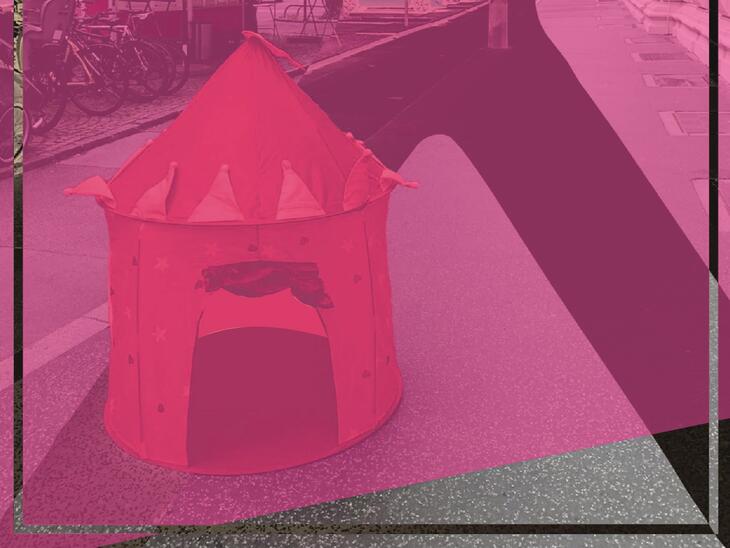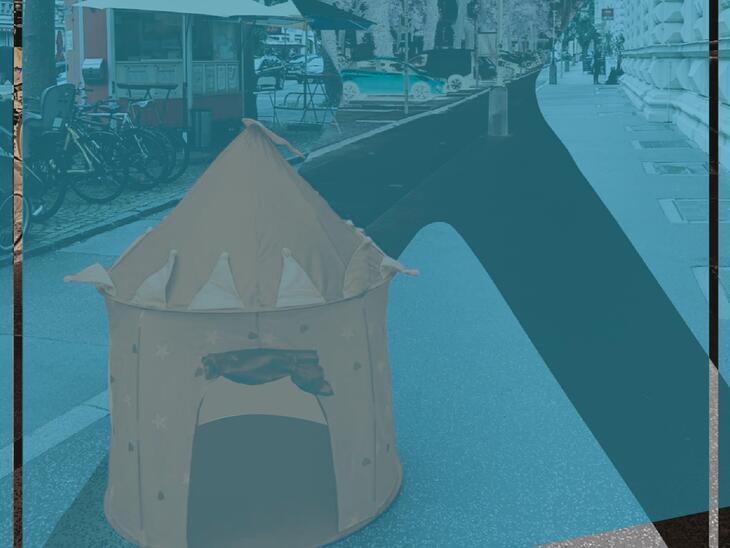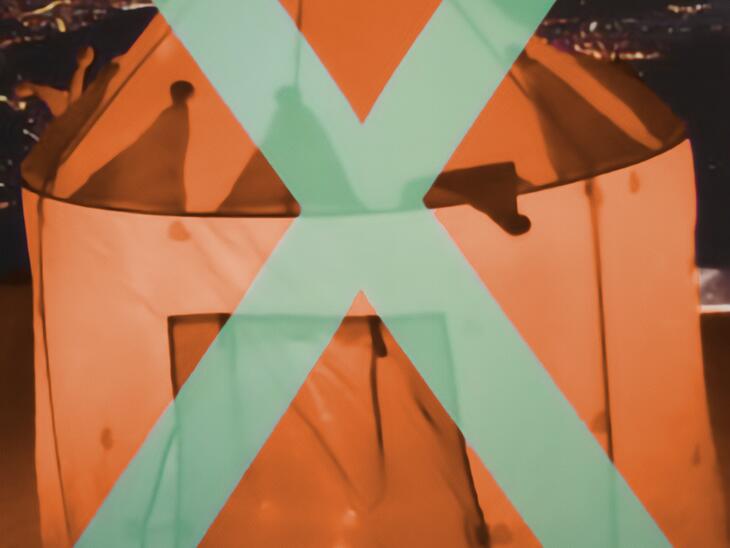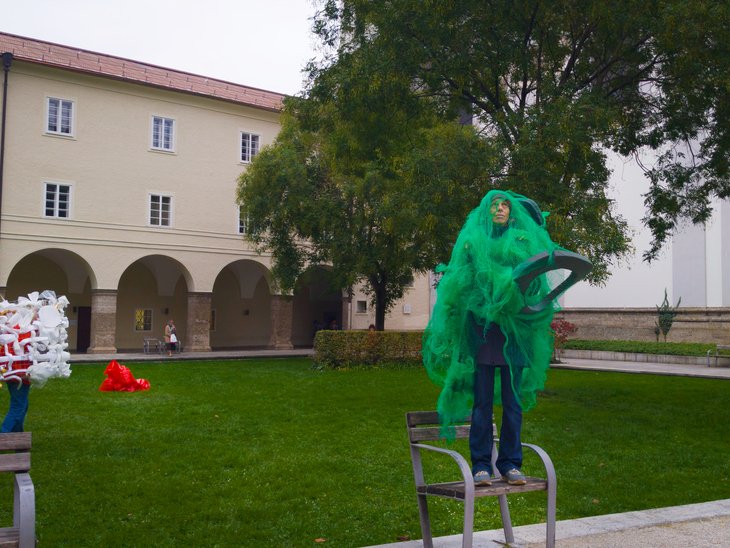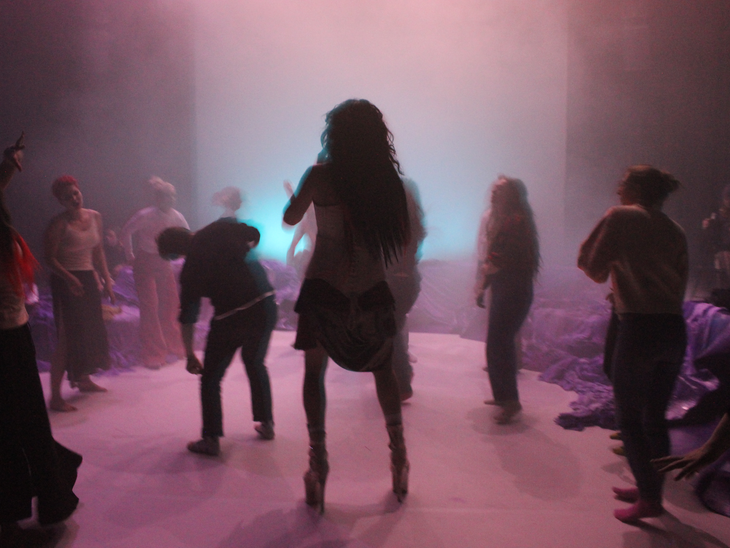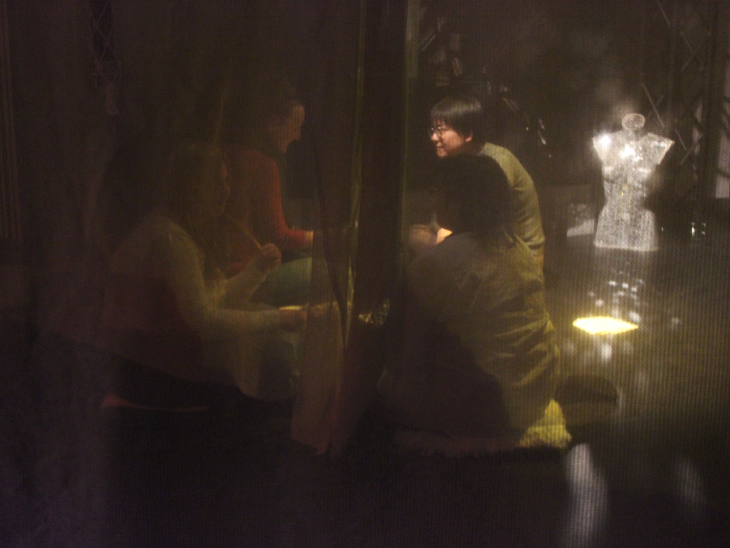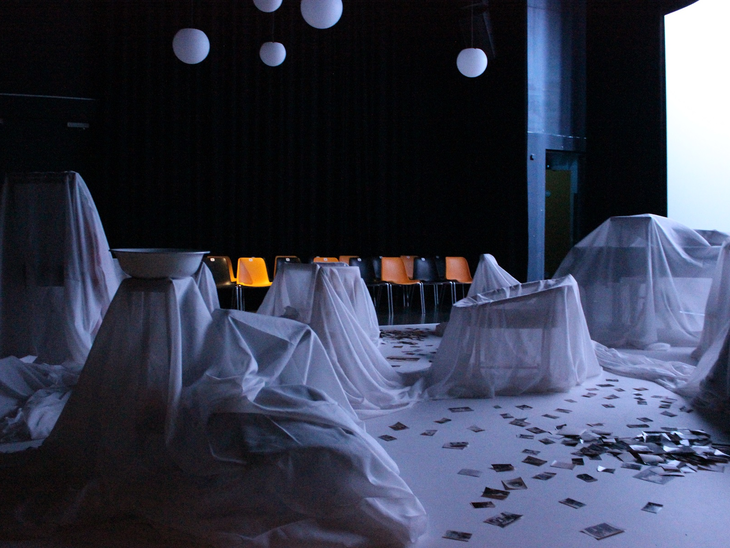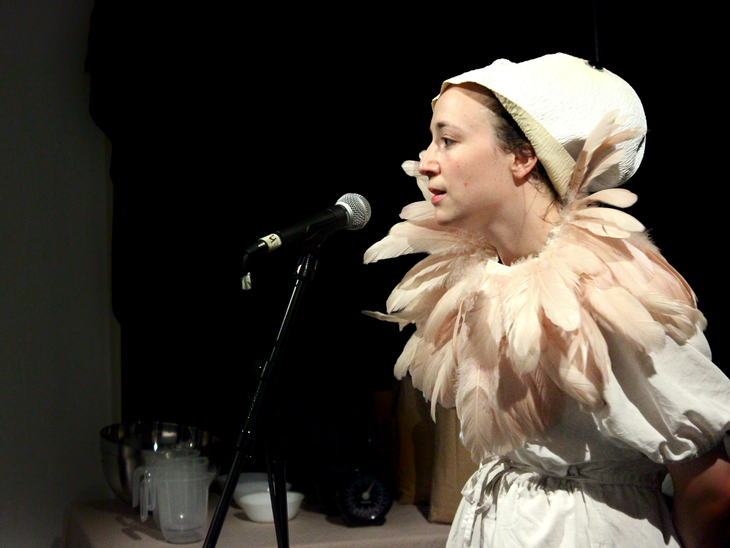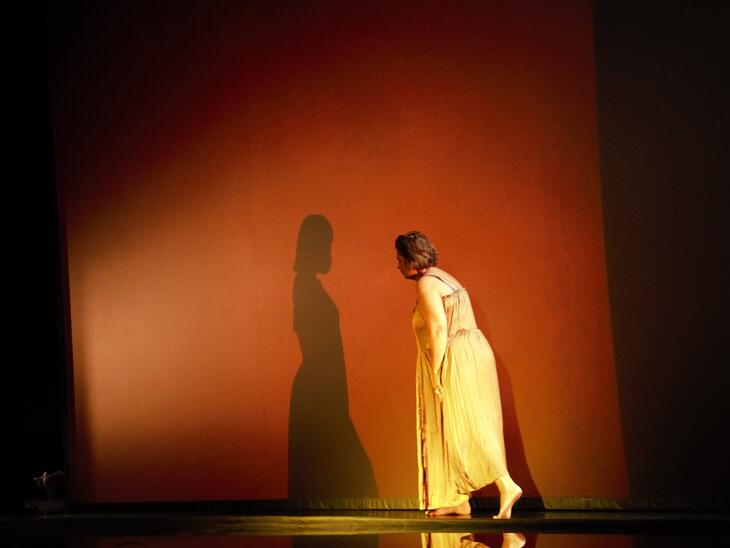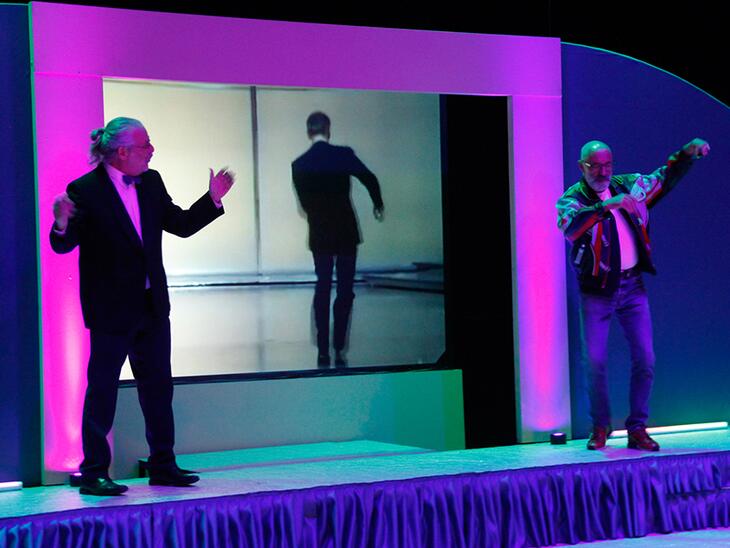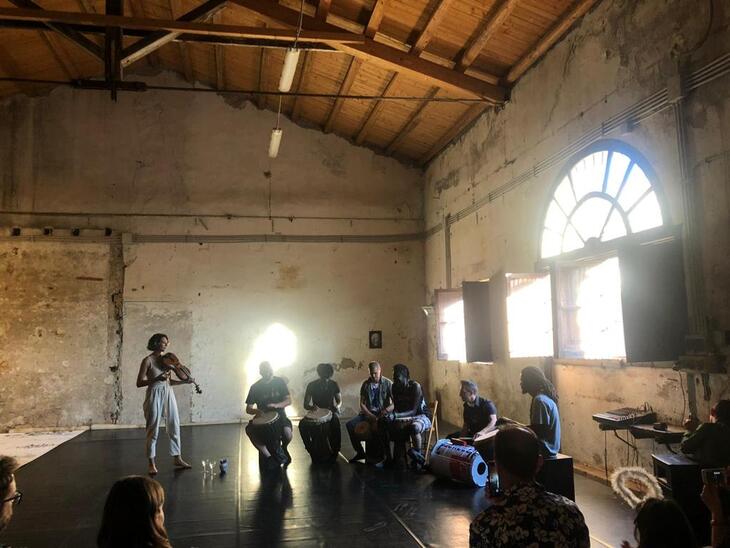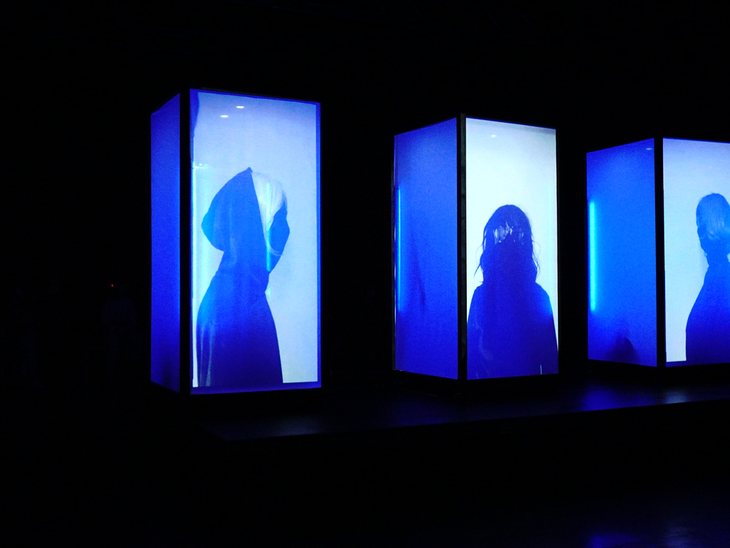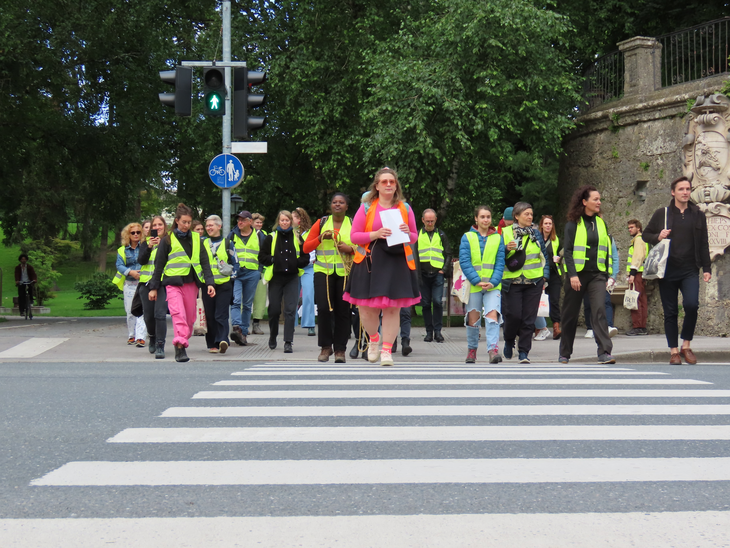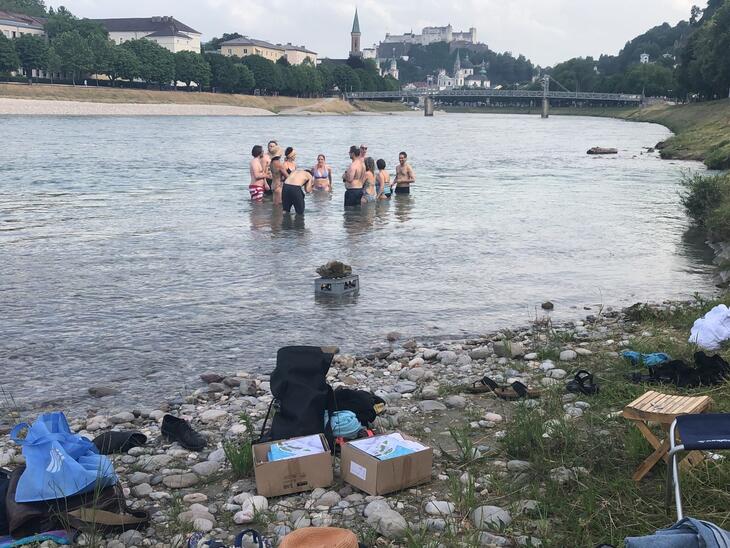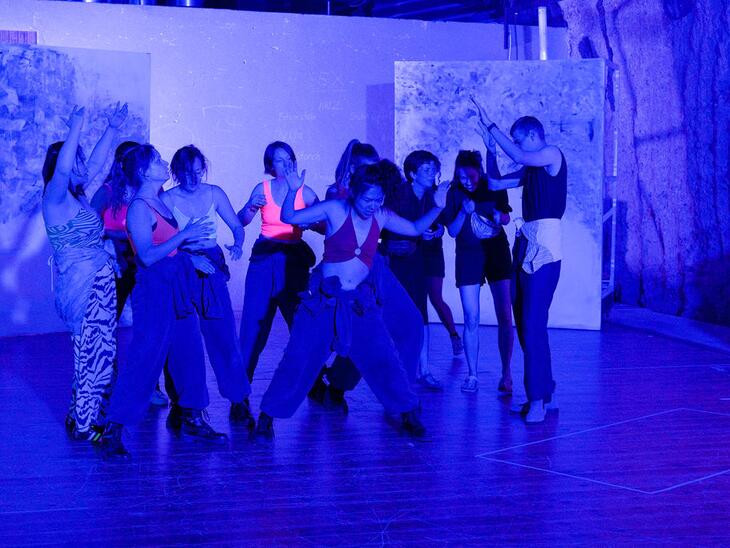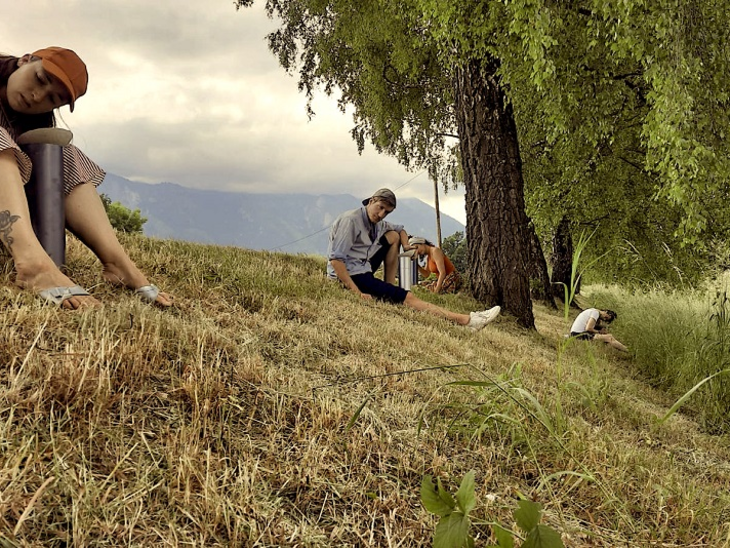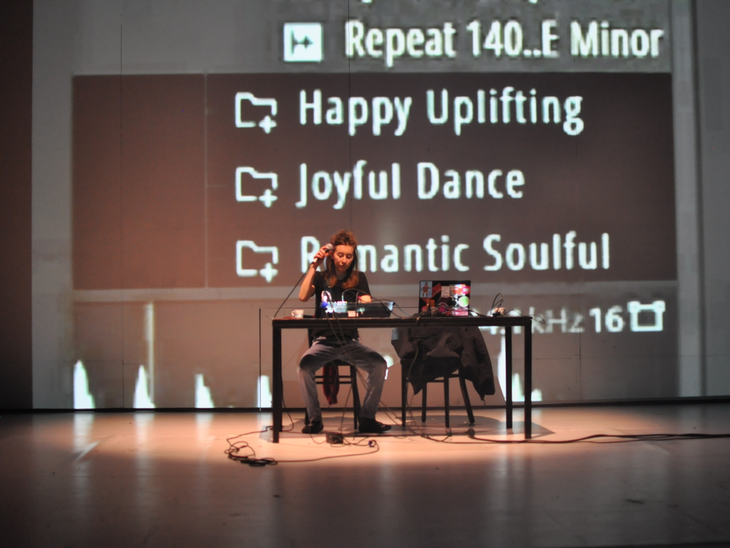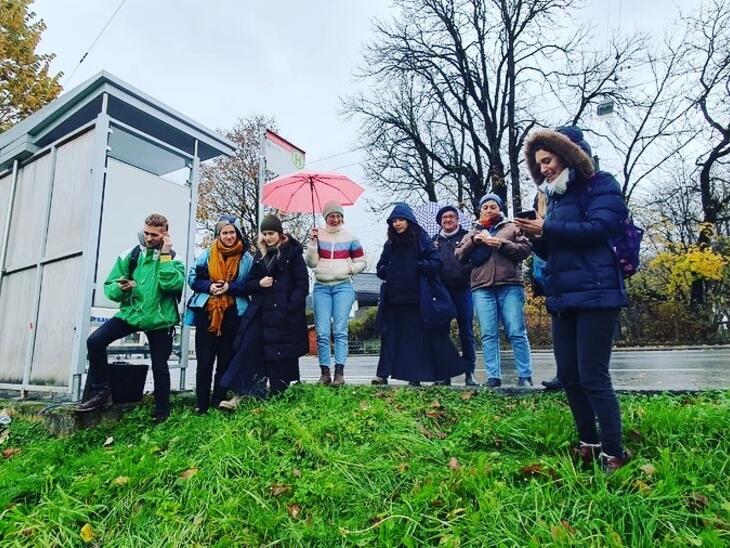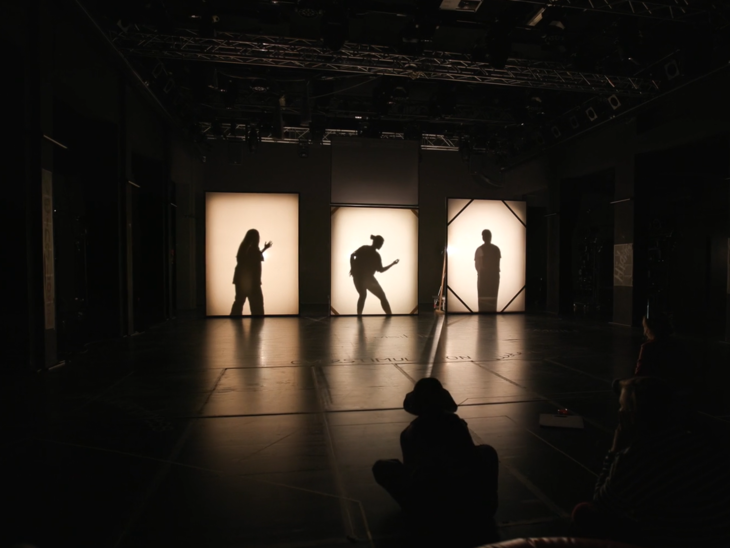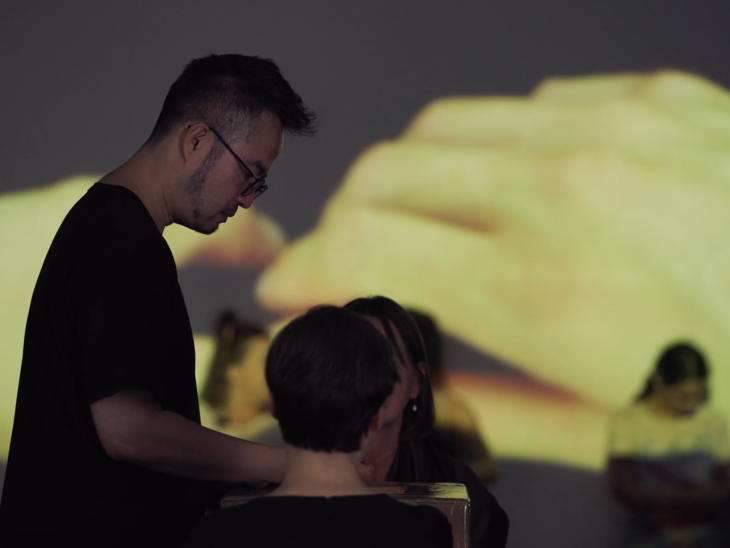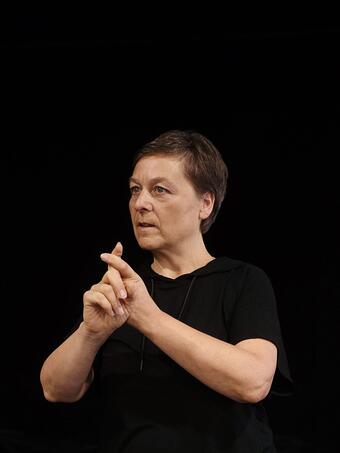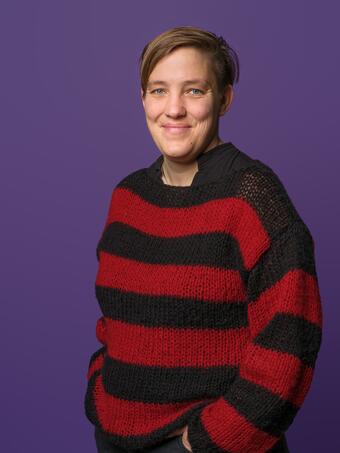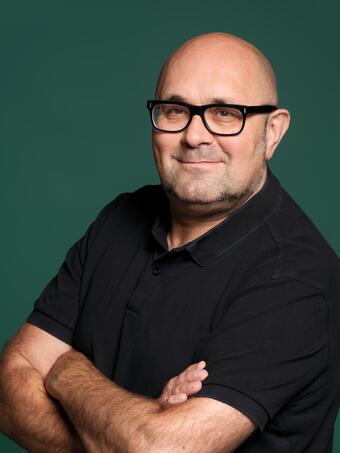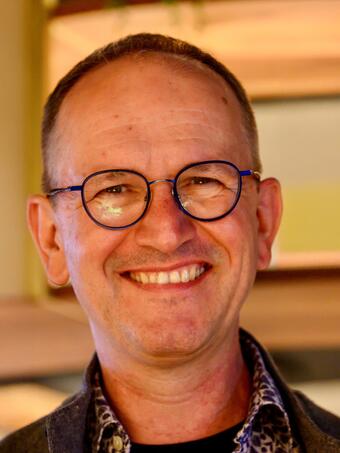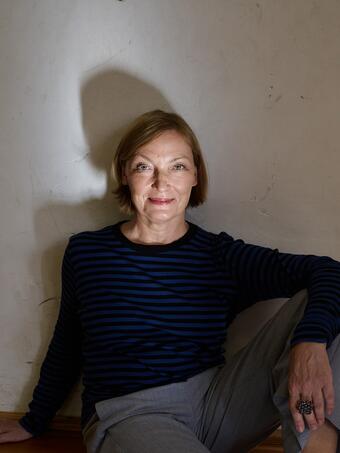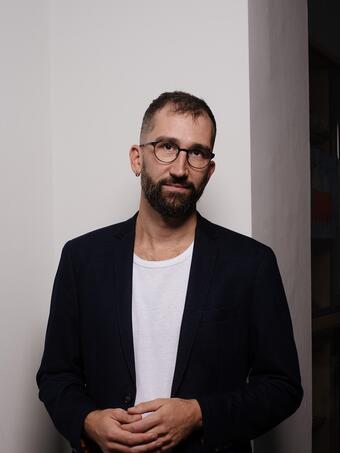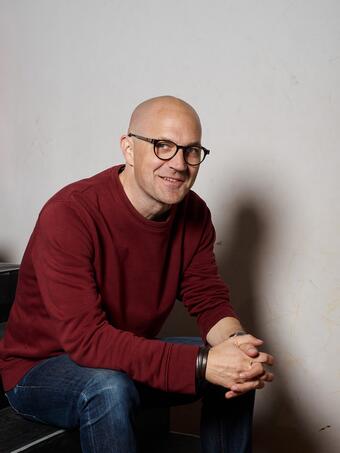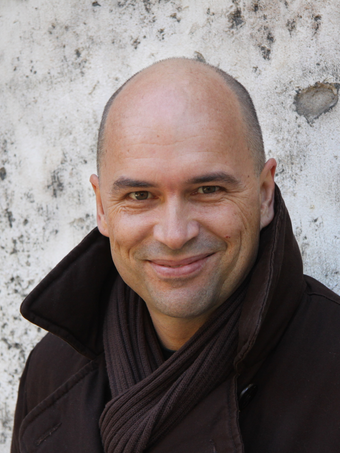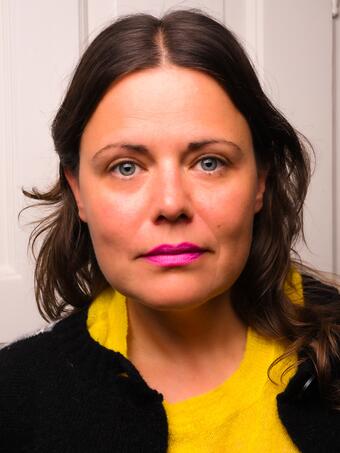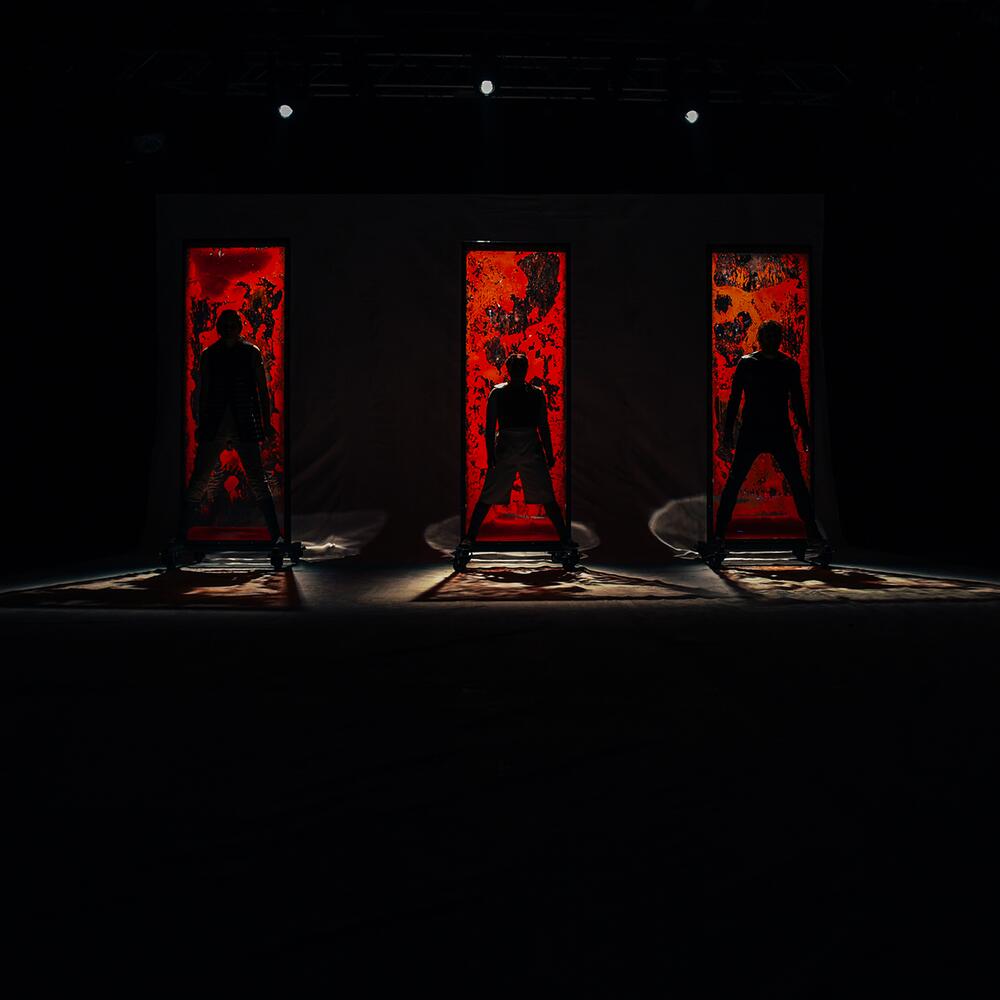Applied Theatre
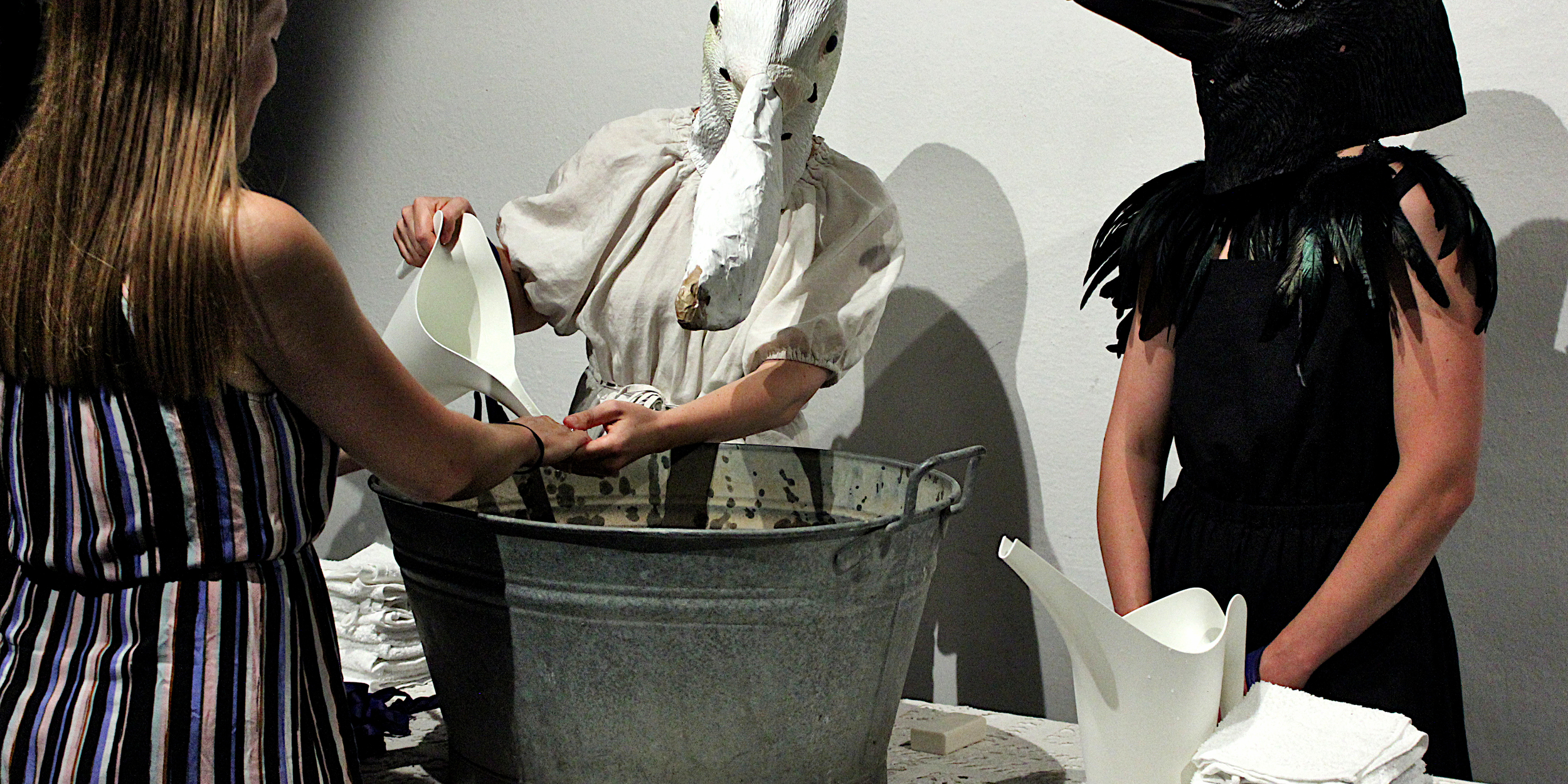
Theater anwenden! Applied Theatre verknüpft Theorie und Praxis mit unterschiedlichen Recherche-, Anleitungs- und Inszenierungsprozessen jenseits gängiger Konventionen. Studierende lernen mit Akteur*innen unterschiedlicher professioneller, kultureller und sozialer Herkunft künstlerisch zu arbeiten und sich mutig und versiert über Theater in die Welt einzumischen.
Studium
Konferenzen
11.–13. Oktober 2023, Online
Eine Veranstaltung des MA Applied Theatre – künstlerische Theaterpraxis & Gesellschaft /Thomas Bernhard Institut in Zusammenarbeit mit dem Institut für Gleichstellung und Gender Studies im Rahmen der Reihe „Social Justice“
QUEER*ATING TEAM: Cat Jugravu & Tandile Mbatsha & Mike Ayvazian
Digital Soirees II umfasst die Überschneidung von queeren Körpern, Identität und Exil im Bereich der performativen und theatralen Künste als einen sich entwickelnden und dynamischen Diskurs. Es bietet die Möglichkeit, historische Konstrukte in Frage zu stellen, sich mit zeitgenössischen Komplexitäten auseinanderzusetzen und die vielfältigen Dimensionen der menschlichen Existenz in einer sich ständig verändernden Welt zu erkunden.
Wir denken über den queeren Widerstand nach, den Gloria Anzaldúa, eine queere Chicana-Feministin, als Borderlands bezeichnete, und fragen uns im Wesentlichen, was eine Grenze ist. Die Frage nach der Natur von Grenzen? Sind sie fest, natürlich, formbar und generativ? Warum wurden sie geschaffen, von wem? Was ist die Erfahrung von Queerness auf transnationaler Ebene, aufgrund von Grenzen? Welche Implikationen und Auswirkungen haben diese Grenzen? Wir glauben, dass es eine Vielzahl von Möglichkeiten gibt, wie wir Grenzen erleben, z. B. geografisch, soziopolitisch, sozioökonomisch, soziokulturell und anders. Diese Erkundung umfasst auch eine Untersuchung der unterdrückerischen Realitäten, mit denen queere Dissidenten in verschiedenen Regionen der Welt konfrontiert sind, vom globalen Norden bis zum globalen Süden. Länder wie Ghana, der Libanon, die Vereinigten Staaten, Ungarn und Russland sind Zeugen anhaltender institutionalisierter Diskriminierung und Verfolgung. Solche bedrückenden Bedingungen zwingen die Menschen dazu, jenseits der Grenzen ihres Heimatlandes Zuflucht zu suchen. Als Reaktion auf diese Widrigkeiten setzen queere Künstler*innen mit unerschütterlicher Resilienz performative und theatralische Künste als Instrument der Selbstdarstellung im Kontext ihres Exils ein.
Die Digital Soirées werden vom Applied Theatre - künstlerische Theaterpraxis & Gesellschaft am Thomas Bernhard Institut der Universität Mozarteum mit finanzieller Unterstützung des Instituts für Gleichstellung und Gender Studies der Universität Mozarteum organisiert. Sie wurden 2022 für die erste jährliche PAC-Konferenz in Zürich von Georges Pfründer in Zusammenarbeit mit Cat Jugravu, Isu Mignon Mignonne und Tandile Mbatsha entwickelt.
2021 wurde PAC unter Mitwirkung zahlreicher Institutionen von der Universität Mozarteum Salzburg (Thomas-Bernhard-Institut, MA Applied Theatre - künstlerische Theaterpraxis und Gesellschaft, Ulrike Hatzer) und der ZHdK, Zürich (Mira Sack) mitbegründet. Ziel von PAC ist es, einen engen Dialog und die Zusammenarbeit zwischen den Darstellenden Künsten und dem Hochschulbereich (z.B. Applied Theatre, Theater in der Ausbildung, Theaterpädagogik) zu fördern. Die Soirées sind ein fokussiertes Segment des PAC-Programms, das LGBTQIA*-Künstler*innen aus der ganzen Welt einlädt, um einen Beitrag zum Queering von Perspektiven in der Hochschulbildung und zu gemeinschaftsbasierten performativen Praktiken zu leisten.
Über die Grenzen hinweg - Räume der Ruhe
Kuratorische Erklärung - Teil 1
Im Bereich der zeitgenössischen performativen und theatralen Künste und Bildung erforscht Digital Soirees II die vielfältigen politischen Aspekte des queeren Körpers und der Identität im Kontext des Exils. Digital Soirees II versteht geschlechtsspezifische Individuen als ein Volk, das sich in einem ständigen Zustand des Exils befindet, dem Borderland. Indem wir die Idee eines festen und stabilen Körpers ablehnen, indem wir den queeren Körper als einen Ort der ständigen Transformation und des Experimentierens annehmen, indem wir unsere Erfahrung und unseren Selbstausdruck über die Anforderungen des cis-normativen Modells stellen. Wir sind physisch, emotional und soziokulturell aus unseren Ländern, unserer Heimat, unserer Indigenität, unserer Gesundheitsversorgung und so weiter verbannt. Diese kuratorische Reise entfaltet sich vor dem Hintergrund der jüngsten globalen soziopolitischen Verschlechterungen, der Sündenbocksuche und des Gatekeeping von Vielfalt und Gleichberechtigung, die unbestreitbar die komplexen Erzählungen und gelebten Erfahrungen geschlechtsspezifischer Menschen geprägt haben.
Über die Grenzen hinweg - Räume der Erholung
Kuratorische Erklärung - Teil 2
In Europa hat das Aufkommen des modernen kapitalistischen Systems, das durch den Übergang vom Feudalismus entstanden ist, das kollektive Bewusstsein über Identität nachhaltig beeinflusst. Diese transformative Ära, die häufig durch die Kommerzialisierung und Sezierung des menschlichen Körpers gekennzeichnet war, setzte ein komplexes Zusammenspiel von Machtdynamiken und gesellschaftlichen Konstruktionen in Gang. Innerhalb dieses grundlegenden Rahmens wurde die Durchsetzung einer starren Geschlechtertrennung zu einem bestimmenden Merkmal, das durch Mechanismen wie soziokulturelles Gatekeeping und systemische Verfolgungen auf Kosten von Individualität und Freiheit gestützt wurde.
Die unglücklichen Folgen dieses historischen Ereignisses klingen zweifellos im zeitgenössischen Diskurs über queere und trans* Identitäten im Kontext des Exils weiter nach. Während in vielen Ländern andere als heterosexuelle sexuelle Orientierungen anerkannt, akzeptiert und respektiert werden, ist dies in einigen anderen Ländern immer noch ein Problem. In 71 Ländern weltweit ist Homosexualität nicht nur ein Problem, sondern sogar ein Verbrechen. Die meisten dieser Länder befinden sich im Nahen Osten, in Afrika und Asien. In 11 Ländern wird für gleichgeschlechtliche sexuelle Handlungen die Todesstrafe verhängt oder ist zumindest eine Möglichkeit dazu. Innerhalb dieses Paradigmas erweisen sich die darstellenden und theatralischen Künste als wirksame Strategien für queere Menschen, um sich in dem komplizierten Labyrinth ihrer Identitäten zurechtzufinden, während sie in Räumen des Exils leben. Diese ausdrucksstarken Medien bieten eine nuancierte Plattform für die Verhandlung von Handlungsfähigkeit, Selbstdarstellung und ein tiefes Gefühl der Zugehörigkeit in neuen und oft unwillkommenen Gesellschaften, die häufig von kompromisslosen Integrationsnormen geprägt sind.
Über die Grenzen hinweg - Räume der Erholung
Kuratorische Erklärung - Teil 3
Wir denken über den queeren Widerstand nach, den Gloria Anzaldúa, eine queere Chicana-Feministin, als Grenzland bezeichnete, und stellen im Wesentlichen die Frage, was eine Grenze ist. Hinterfragen wir die Natur von Grenzen? Sind sie fest, natürlich, formbar und generativ? Warum wurden sie geschaffen, von wem? Was ist die Erfahrung von Queerness auf transnationaler Ebene, aufgrund von Grenzen? Welche Implikationen und Auswirkungen haben diese Grenzen? Wir glauben, dass es eine Vielzahl von Möglichkeiten gibt, wie wir Grenzen erleben, z. B. geografisch, soziopolitisch, sozioökonomisch, soziokulturell und anders. Diese Erkundung umfasst auch eine Untersuchung der unterdrückerischen Realitäten, mit denen queere Dissidenten in verschiedenen Regionen der Welt konfrontiert sind, vom globalen Norden bis zum globalen Süden. Länder wie Ghana, der Libanon, die Vereinigten Staaten, Ungarn und Russland sind Zeugen anhaltender institutionalisierter Diskriminierung und Verfolgung. Solche bedrückenden Bedingungen zwingen die Menschen dazu, jenseits der Grenzen ihres Heimatlandes Zuflucht zu suchen. Als Reaktion auf diese Widrigkeiten setzen queere Künstler mit unerschütterlicher Resilienz performative und theatralische Künste als Instrument der Selbstdarstellung im Kontext ihres Exils ein.
Digital Soirees II umfasst die Überschneidung von queerem Körper, Identität und Exil im Bereich der performativen und theatralen Künste als einen sich entwickelnden und dynamischen Diskurs. Es bietet die Möglichkeit, historische Konstrukte zu hinterfragen, sich mit zeitgenössischen Komplexitäten auseinanderzusetzen und die vielfältigen Dimensionen der menschlichen Existenz in einer sich ständig verändernden Welt zu erkunden.
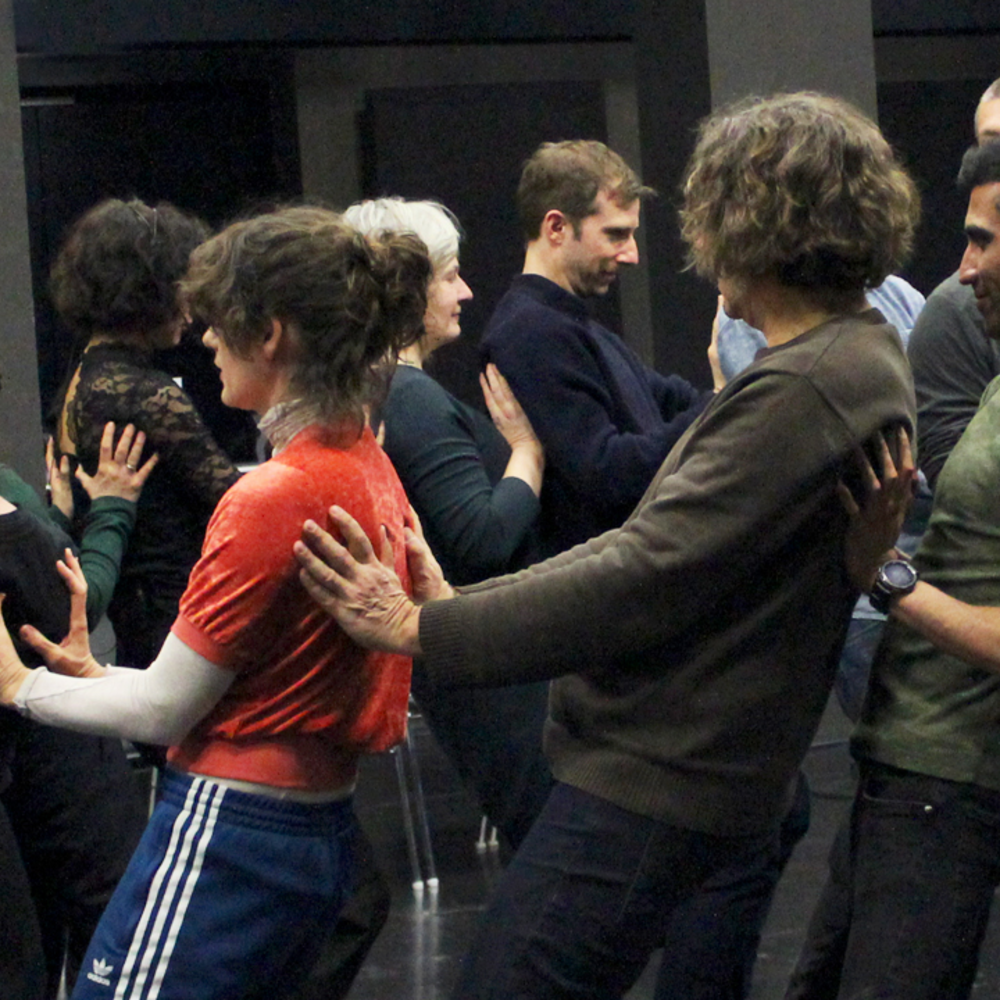
Wessen Perspektive zählt? Temporäre Strategien zum Dekolonialisieren der eigenen Arbeitspraxis
9.–11. März 2023
Veranstaltet / kuratiert von Applied Theatre in den Räumen von AT und im TIKQ - Theater im Kunstquartier
Dynamic practices - Static terms
5.–8. Mai 2021
Host/Organization: Ulrike Hatzer, Head of MA Applied Theatre, Judith Franke, Senior Artist at MA Applied Theatre
Semesterreports
Autor*in: Paochang Tsai
Well, how should I begin?
As an exchange student, my naive thought before arriving at this institute was: hey, let’s have a very chilled one-year ERASMUS+ exchange experience. Maybe, for the first time, I’d get to live the so-called notorious ERASMUS life—parties, drinking, fun.
But if you’re a playwright, you know every good story needs a twist. My experience in the Applied Theatre program at Thomas-Bernhard-Institut, Mozarteum turned out to be unexpected, beautiful, profound, and intense.
Due to the nature of the program, once you're in, you're all in. Every semester, the faculty designs a main theme, and all seminars and courses revolve around that theme, in the summer terms building toward a collaborative summer project.
For the Summer Semester 2025, our theme was "X-Human Minutes: What Would You Do?". Inspired by Stanisław Lem’s One Human Minute, we developed a premise: if humanity vanished in the near future, what would your preserved “one minute” be for any future visitors—human or not—to witness? We explored concepts like coexistence, youth perspectives, memory, and connection. Initially, we wanted to work with teenagers, believing their voices are often underrepresented in Salzburg. We contacted several youth centers and organizations to recruit teenagers interested in performance and collaboration—with us, the first-year Applied Theatre Master’s students (Sophie, Salome, Xindi, and me, Pao) and Ulrike Hatzer, the head of our program.
Allow me a brief detour: as mentioned, all seminars are tailored to prepare us for the summer project. Some highlights include:
Leading, Planning, and Facilitating with Judith Franke (Senior Artist, Applied Theatre): We improvised around various themes to design self-conducted workshops, using our group as a test audience and sharing feedback afterward. This prepared us for proposing workshops at different youth centers or organizations to recruit potential participants.
Interview Techniques with Tobias Rausch: We explored various interview styles and metaphors, analyzed transcripts, and spent time interviewing one another. These exercises directly informed our Act One “function card: questions.”
Theatre & Document with Nicole Baier: Nicole offered hands-on knowledge of basic framing, editing, and the history of documentary film. We practiced improvising with three-shot structures and learned to edit using the free software DaVinci Resolve. Nicole later played a key role in developing the prologue footage and the overall project setup.
Theatre & Document with Maryna Yakubovich (lecturer acting Thomas Bernhard Institut): We revisited our past works and proposed new topics we wanted to explore. Maryna led us through theatre-based exercises—reincarnating roles, re-staging past events—to rediscover artistic potential. Her guidance helped us view our projects from a directorial perspective.
Theatre & Document with Trace Polly Müller: Trace offered an emotionally supportive, open environment. Her reading suggestions were rich and engaging. Though this seminar seemed the least goal-oriented, it turned out to be one of the most meaningful two-day workshops I’ve experienced—a deeply healing and truly collaborative space.
Intervention/Participation with Azadeh Ganjeh: By the time Azadeh arrived, we had collected plenty of raw material but didn’t know how to shape it. Azadeh introduced practical exercises to help clarify our intentions and core messages. One favorite was the "Fun Fact" game; another involved recounting past events from a third-person perspective. These approaches proved highly effective when later used with our youth participants.
Outside of these seminars, we had regular classes with Christian Sattlecker (lecturer for Movement, Awareness, Politics) and Tobias Keil (lecturer Voice and Speech, Thomas Bernhard Institut), both essential in strengthening our mental and physical readiness for the semester. I personally found the individual sessions with Tobias very helpful and beneficial.
Now, back to the summer project. A significant part of the work was community outreach—never an easy task. While some teenagers showed interest, it felt nearly impossible to actually bring them in. Many who frequented the youth centers had established routines and comfort zones and understandably didn’t want to leave them. Realizing this, we decided to restructure the project into three acts, each in a different location—from the Applied Theatre space, through the city via parkour, and ending at the Youth Centre Lehen “Spektrum”. As Ulrike aptly put it: "If they don’t want to come to us, we’ll go to them."
Our collective process embraced a non-hierarchical / hierarchy critical approach. Everyone—regardless of age, gender, or experience—had a voice in decision-making. We divided responsibilities (materials, finances, props, dramaturgy, etc.) and supported each other throughout. During outreach, we (re-)met Mustafa Durgut, a musician and boxing coach originally from Turkey. Starting in February, we trained with him regularly—twice a week—experimenting with various warm-ups and basic boxing techniques.
This seemingly never-ending outreach process led me to a key realization: I came to enjoy the “no specific purpose” mindset. We didn’t always know where each activity would lead, and that was okay. Unlike conventional production-making, where structure and foreseeable outcomes are fixed, here we embraced the unknown. While often stressful—like being lost in a forest—it was also incredibly valuable. I learned how to navigate uncertainty, to adapt, and most importantly, to respond to challenges with a calm mindset.
Building a community takes time. Mustafa eventually became an ally. Peter, Ulriana, and Julia joined later and contributed unique moments of their own. And Ari Pellini, our amazing technician, was always there to provide support.
Our structure for X-Human Minutes: What Would You Do? was as follows:
Prologue: One-Minute Connection – Audience members entered the big studio of Applied Theatre and were invited to sit next to a small paper-lit box, place their hands inside, and form a connection that was filmed and later projected on the wall.
Act 1: Performed in the big studio using props such as cards (jokers, fiction), a lottery pot with tasks (only the joker could initiate), tapes to mark space, and six sand clocks to measure time. Each performer received a function card and a joker, determining their main task in Act 1. Group activities, including language exchanges and shadow boxing, were also added to the lottery.
Act 2: Parkour journey through the city. The first stop was at the Salzach River. We asked participants to listen closely to their surroundings and later imitate a sound they’d like to preserve, recording it via mobile phone. After crossing the train bridge, the audience split into two routes (Literaturhaus and a pavilion near the university). Later, they regrouped: one group visited a phone booth to call or text someone—ideally the youngest in their contacts—to ask for advice or a shared moment; the other group climbed the "spider cube" in a playground in pairs, extending the prologue’s theme of connection.
Act 3: While Acts 1 and 2 were happening, Nicole Baier led a workshop at Youth Centre Lehen, recording one-minute clips with kids. When the main group arrived, the recreated Act 1 setup was already preset outdoors. Each person stepped into a square-meter space and shared a moment. The youth also presented what they had created earlier.
Audience feedback was overwhelmingly positive. One remark especially stayed with me: "This performance reminded me how precious one minute is—and that I shouldn’t take it for granted."
Lastly, scheduled feedback (both group and individual) took place during the final week of the semester. Each student had a 15-minute conversation with all major lecturers and received thoughtful, personalized reflections on their achievements.
So, here we go… my time here has finally come to an end. Was my ERASMUS+ year filled with "parties, drunk, fun"? Actually—yes, but not in the way I expected. Applied Theatre itself felt like a big party: open, safe, full of friendships. I must admit, during the most stressful two weeks of the summer project, I consumed an entire bottle of Sloe Gin from Hallein (highly recommended if you’re a gin lover!). Was it fun?
Absolutely.
So fun that I feel more like a Mozarteum student than one from my home university in Gießen. So fun that I built real partnerships. So fun that it makes leaving bittersweet. So fun that I know—no matter what—I’ll always have a home here in Salzburg.

Autor*in: Xindi Cao
The theme of this semester is Morphing Salzburg: Kafka as Urbanizer and as a Method. This indicates two things: first, we work on/around the spaces and places of Salzburg; second, we mention Kafka a lot. I will explain in the following two paragraphs.
We took Salzburg city as our field of observation and lab for experiment, looking for pieces and gaps that we can intervene in and seeking change. As an ultimate home-stayer who would not get out unless there’s a crisis in my food storage, I am forced (no, encouraged) to get out and interact with the city. Many of our classes happened outside the institute, especially the blocks Theatricalisation and Performativity. In Ulrike Hatzer’s (Head of MA Applied Theatre) and Judith Franke’s (Senior Artist of MA Applied Theatre) class, we went on a “deríve” (inspired by Deleuze’s theory), mapped our findings, added tiny actions at a place of choice and brought back fallen leaves and fruits as “souvenirs”. Christian Sattlecker (docent for movement politics and Feldenkrais, Thomas-Bernhard-Institut) (https://www.moz.ac.at/en/people/thomas-bernhard-institute/christian-sattlecker) invited us to talk about the concept of morphing and metamorphosis. We also talked about our impressions of Salzburg, which urged me to get out to confirm if my impression coincides with the reality. Then, we went on a “Christian selected” guided tour, starting from our institute and ending at the top floor of the city library. With Ulrike Hatzer and Mirjam Klebel (docent for Choreographic Strategies, Thomas-Bernhard-Institut) , we explored Linzer Gasse, noticing the “no” spaces and creating “no” movements. What many of us enjoyed the most was the class with high school students from Musisches Gymnasium. They are so creative that I came to the conclusion that “a bachelor’s degree is not necessary for applied theatre” (note for prospective students: this sentence only represents the author’s personal remark in a specific context. For admission, please refer to the Application Procedure aka. YOU DO NEED ONE.) As we climbed over the guardrail to reach a secret space under a bridge, I felt very illegal. In the Space and Sound workshop with Barbara Lubich, we did a listening exercise in Mirabel Garten and the main building of Mozarteum, followed by a discussion about what it means to listen and how this influences our encounters with others.
We took Kafka as a deriving point of artistic research. In Chistian Sattlecker and Christoph Lepschy’s (Prof. for Dramaturgy, Thomas-Bernhard-Institut) class, we discovered that students in our group had had a different level of exposure to Kafka previously. For some of us, Kafka’s work is part of the middle school curriculum, while for others, Kafka is a distant and unfamiliar name. Despite that, we talked about our connection to or imagination about Kafka. It’s healthy to acknowledge this and see it unjudgementally. After all, we were not doing a literature analysis on his work, nor turning his work into a theatre piece. For Christoph Lepschy’s Dramaturgical practices, which happen bi-weekly, we worked on two texts: The Great Wall of China and The Burrow. We discussed how Kafka’s work is a minor literature as opposed to national literature. Each of us shared the sentences or paragraphs that impressed us the most, took it as the starting point, and formulated a research question related to our contemporary society. What inspired me the most was the exercise using objects about the chosen texts, which took dramaturgy out of written texts and put it into situations and actions. In one of Mirjam’s choreography classes, we took the chosen sentences as the motive of improvisation, which, in a very corporeal sense, indicates a possible way from text to movement.
Let’s stop talking about Kafka. To be honest, the immigration office and the bank make my life in Austria an immersive Kafkaesque experience, much more immersive than theatre. In other words, I did feel that I was experiencing my daily life with the enhanced sensation and theoretical framework that the courses in applied theatre brought. Who knows if it’s a good thing or not?
The weekly trainings – Christian’s Movement, Awareness and Politics and Tobias Keil’s (docent for voice and speech, Thomas-Bernhard-Institut) Voice and Speech, acts as a mirror of my state as well as the group energy level. Besides training ourselves to become a performer and gaining strategies to make others perform, for me, these classes also remind me how I can bring my doubts in daily life into theatre and notice how my body and voice change over time. The Choreographic Strategies with Mirjam become blocked workshops for this semester, where we have enough time to warm up and then develop and reflect more on a topic. There was so much laughter in this class. Choreography is nerdy, but magic!
What also happened weekly is Urbanizing and Performance, curated and facilitated by Ulrike. For the first half of this course, we did a lot of “soft reading” of Henri Lefebvre’s The Production of Space, which is a strategy to deal with overused texts. A two-day mini-conference was held in the framework of this class, where we presented related topics in pairs: derive (introduced by Sarah and me), critical mapping (introduced by Nastya and Rose), action art (introduced by Tin and Pao), Guerrilla Strategies (introduced by Sophie and Nina), and site-specific performance (introduced by Salome and Alexandra). For the rest of the semester, Arthur Zgubic from ohnetitel, Simone Seymer and Oliver Hangl were invited to share their artistic practices based on places in Salzburg, Hallein, Viena…
The first-year students attended Short Format, Open Format with Judith and the TheaterLaborX – the Open University format of Applied Theatre - following that, hosted by Andreas Steudtner. We discussed who is not in LaborX, thought about and tried out actions to reach out to them. Lilli Tchourlina took over a session to try out the material for her master’s project, which premiered in October. Farah Deen, the co-founder of Flavourama brought a House Dance workshop, turning the studio into a pub. Susanne Litschauer (Linklater/voice and speech, Thomas-Bernhard-Institute) and Mirjam also shared their practices as LaborX guests. The four of us first-year students hosted two sessions in pairs. Sophie and I hosted one about protest, and Pao and Salome hosted one about letter writing.
In Applied, theory is never merely on paper. With Judith, we had The Pedagogy of Empowerment seminar, where we read Bell Hooks’ All about Love, Feminism is for Everybody, and The Teaching Community: A Pedagogy of Hope. We wrote diaries and experimented with our created scores inspired by these works. I like the way the text not only made me reflect on the education I had before but also accompanied me throughout my everyday life. In the intensive and most “theoretical” class- Theatreanthropology with Dr. Babafemi Folorunso, we dived into Edward Said’s Orientalism and discussed how theory is inherently produced in the power structure. In Applied Theory with Kai Ohrem (Prof. for Acting, Thomas-Bernhard-Institut), we started by drawing a monument in our memory, discovering how monuments are the opposite of “minor”. Through this exercise, we looked at Deleuze and Guatari’s theory on minor literature.
The excursion destination for this term is Graz, where steirischer herbst 2024 HORROR PATRIAE is taking place. We had guided tours of exhibitions in Neue Galerie Graz, Forum Stadtpark and Grazer Kunstverein, and went to performances: Chimeric Tendencies by Xava Mikosch, Warenhaus Wanderlust by Thomas Verstraeten, and Corridos Estiria by Gerald Straub. Only the first one happened in a theatre space, while the others were in a shopping mall and a roundabout an hour away from the city. Additionally to the festival program, we also visited Theater im Bahnhof, a collective with experience of long-term collaboration, and a community art space built on an abandoned mill. It’s interesting to see how the space is taken over by different groups of people and how they negotiate. We played punk music after a punk & rap protest workshop (I wish I could insert videos here). The biggest takeaway: Applied theatre is punk theatre.
Parallel with the Graz excursion, we started the Tryouts for the semester project in October. Among 14 students in the first and second year, we worked in pairs and reflected on the mechanism and strategies of pair work. On the train to Graz, the thrilling lottery decided who we were about to work with. The kick-off happened at an outdoor café in the centre of the river in Graz, accompanied by water white noise. Tryout 1 happened three weeks later, where the initial ideas of each pair were put into practice. In December, we did Tryout II, which was integrated with the DasArts-Feedback Method workshop by Georg Weinand. After the Christmas break, the tryout 3 came. Although it was the last tryout, we treated it as an ongoing process and reflected on it as if there would be “tryout 4”. You may get a glimpse of our works:
- - Nina & Salome: In loving memory @Residenzplatz
- - Sarah & Xindi: Aigenheim @VS Abfalter and the streets around
- - Sophie & Nastya: Things I take with me @Liefering
- - Alexandra & Rose: Auslander rein! @Franz-Josef-Straße 2a
- - Tin & Pao: Leave A Chair @Getreidegasse 33
In the last week of the term, we had feedback talks with the docents on tryout 3. A feedback session of the whole semester is also held, where we put sticky notes with questions and inspirations on our schedule (it’s long!). While the second-year students were commencing their master’s project and had their supervisor decide, the first-year students had preparation sessions with Mirjam, Ulrike, and Judith on the summer project for the next term. For the summer project, we are going to work with young people, which I’m both nervous and excited about. It’s a group of people I’ve been wanting to work with but never did.
In closing, I wanted to say, I didn’t lose hope in Applied Theatre
(yet)
(well, sometimes I doubt)
(but people in Applied are lovely)
Autor*in: Tin Blümke
Welcome to Thomas Bernhard Institute (https://www.moz.ac.at/de/thomas-bernhard-institut)! The Mozarteum’s theatre department. Here, you can study acting and directing. Oh, and a secret, quirky third option. …”Applied Theatre”?? That’s right. That’s us. And you’re about to find out what we did last summer.
Before classes even officially started, Nina and I, Tin, did a small weekend road trip to Augsburg to the Brechtfestival where we watched Rimini Protokoll’s Der Kaukasische Kreidekreis. There, we also met Judith Franke (Senior Artist, Applied Theatre) and Claudia Seigmann both of which we would go on to work on our collective and documentary research summer project Feminist Cities Walk with.
The following week, all six of us first-year-students came together again and properly started into the summer semester. Except, there were actually seven of us now. Cristina from the second year joined us for the whole semester and made a wonderful addition to our group dynamic! With Nicole Baier we jumped right into a discourse about reality and arts as well as one of our greater topics this term and at the same time a seminar series curated by Ulrike Hatzer: Theatre & Document. Nicole is a documentary film maker and she took us through the process of creating small film pieces about different emotions.
Soon after, we first got together with Claudia and Judith to discuss the technicalities of how our summer semester project would go. Over the semester break, we students had been invited to read two books: namely, The Feminist City by Leslie Kern and Rest is Resistance by Tricia Hersey. These were the baseline for our research topic this term: feminism and city planning. Under the working title “FLINTAstic City” we were to develop a project that was to be presented in early June within the Sommerszene Festival (https://www.szene-salzburg.net/sommerszene). Our process would be collective and we would work for the following months to create content for a walk all the way from our institute, up the Mönchsberg to the Museum der Moderne.
With this framework set, we started first into two months or inspirational work. With Christoph Lepschy (Prof. for Dramaturgy at TBI), we had a session of several days in which we discussed historical as well as current discourses about collectivity and collaborative work. We also started into trying out some small-scale collective work with documents.
Early in the semester, the Mozarteum project days defined our second week in March. Under the motto “Intermozzo” each of us recycled bits from our winter semester projects and showed some pieces and inspirations from them in our institute and across campus which was a lot of fun. Judith, Nina and I also ran a Labor Xtra about city-scaping and (re-)claiming spaces in the city.
In the spirit of documentary work, one of our main classes was called Interview Techniques & Research Strategies, which was curated and hosted by Ulrike Hatzer, head of Applied Theatre (https://www.moz.ac.at/en/people/thomas-bernhard-institute/ulrike-hatzer). We started the input on this with Ulrike and spent some time developing catalogues and lists of questions as a method of research. In this class, we also had Christine Umpfenbach coming in as a guest lecturer. She shared her work with us and specifically talked to us about how to find people for expert work on and around stage.
Before the Easter break, we had a week full of input on our semester work. Lajosch Talamonti visited to share stories from his experiences with collective work as a part of the performance collective Interrobang. We went to Munich to see Doris Uhlich’s work In Ordnung at the Kammerspiele, as well as to Linz where Claudia as part of theaternyxhad just created an audio walk called ÜberMorgen that took participants through an imaginary Linz in the year 2060 which was very inspiring for our further project work.
A constant in our day to day life at Applied Theatre was and is still the Open University >Format Labor X on Monday evenings. Here, we got to experience many interesting hours of workshops by Andreas Steudtner as well as various teachers and guests. And, of course, each of us students ran a session as well, some of us alone, some of us in teams
Workshops were a big part of our semester as we also continued our work in Leading, Planning, Facilitating. In this term, we each reached out to a group in Salzburg that is concerned with topics of feminism to design and facilitate a workshop for them. Cristina worked with Zentrum ELF – Starke Mädchen (https://www.zentrum-elf.at/). Nastya reached out to the school group from the CoCreArt festival in cooperation with Wissenschaft & Kunst (https://w-k.sbg.ac.at/veranstaltung/reduce-reuse-refuse-rethink/) . Alexandra got together with JUZ teilweise (https://teilweise.or.at/idee/). Rose facilitated a workshop for a group from Frau & Arbeit (https://www.frau-und-arbeit.at/). Sarah developed a Happening for members of QueKuSa Magic Garage (https://www.quekusa.at/magicgarage). Nina ran an inspiring session for people from the HOSI’s queer youth group. And I got to work with Salzburg’s own OMAS GEGEN RECHTS about political engagement and theatre.
After Easter, Lajosch Talamonti came in again as a guest lecturer in the framework of the seminar Theatre & Document as he had already before easter. While before Easter he had talked about his own collective work within the seminar series On collectivity by Ulrike Hatzer, this time, he shared stories from his document-based work with Regine Dura and Hans-Werner Krösinger. We learned a lot about history and about ways of including documents in rehearsal practice as well as on stage. Meanwhile, our own collective work always continued on the sidelines. In our next sessions after Easter, each of us students brought in perspectives on our personal interests in feminism and aesthetics of a feminist city.
In mid-April, we shared a very intense week with two guest teachers. First, Esther Strauss came in to talk about documentary work. She shared a lot of experiences from her personal work, coming from fine arts and working a lot about her family’s history during the reign of the Nazi regime in Austria. She invited us to bring in objects ourselves and do a very personal research into their histories and meaning. After that, we spent two very physical days with Claudia Heu who talked and walked us through ways of using the body as means of intervention and participation, also research. Her concept of a universal choreography took us into and through the city in new ways.
In late April we spent three days in the ARGE in Nonntal where we got to work with Ursula Schwarz and Felix Ludwig about documentarism and bodies within the framework of the production B:R:HR:NG (touch). The Digital Spring at ARGE allowed us to develop an open lab of mediation formats to really bring together what we took from the process of working about documenting touch in the digital space.
This experience also signalled the end of our inspirational work for this semester. Starting in May, we really dove into our collective work and into developing our Feminist Cities Walk. First, however, we had the great pleasure of hosting the third application round for the new Applied Theatre year that will follow and join us in the next winter semester. We met so many lovely people there and are truly excited for a new year to shake things up a little and add their perspectives in October!
The collective work was very busy and certainly had its ups and downs. Many different perspectives had to be brought together. Luckily, the format of a guided walk that had been chosen for the final result gave us the liberty to bring in many topics and design different “stations” for our audience to participate in on the walk. The entire semester was, as always, seamed by the weekly trainings we have. Voice & Speech with Susanne Litschauer who teaches the Linklater method, and Feldenkrais lessons with Christian Sattlecker. Mirjam Klebel did not teach weekly classes on Dance, Movement and Choreography this semester. Instead, she came in on several occasions to run day-long classes with us and gave some really valuable and specific input in our documentary work.
June rolled around quickly – as it always does – and we frantically worked to bring our Feminist Cities Walk together. A joined manifesto was created, we designed stations such as ‘talking houses’ around the Mirabellgarten, an interactive game explaining the community currency Gibling, a water ritual across Salzach river, utopian inputs up the stairs, different physical inputs on care work on the playground. This was followed by feminist ways of moving, a green station about the support system of trees, a lookout with binoculars reminding the audience to consider animal life in the city, a feminist hymn and parade, ending a short walk away from the Museum der Moderne where our final station invited people to buy the Gibling, taste water from different cities, take plants we grew, exchange clothing, have a snack or just talk.
We had three days of good weather and one rainy walk that our audience of twenty people bravely fought itself through and we heard a lot of wonderful feedback. Of course, we also got to see many other amazing performances and pieces at the Sommerszene festival! Special thanks must also go to our technician Ariane Pellini who supported us every step of the way and didn’t hesitate to try everything to make our vision of a Feminist Cities Walk come true.
As always, we finished the term with feedback and reflection rounds. This term, however, we also got to celebrate the 5-year-anniversary of Applied Theatre (https://www.moz.ac.at/de/news/2024/06/10-aushandlungsraum-parlament-und-spielplatz-fuer-morgen )with a Labor XXL which was a lot of fun! To celebrate, we also had a workshop with the Radikale Töchter who did a two-day workshop with us about Action Art that was very hands-on and taught us a lot.
Of course, the work never stops: Alexandra and Nina already started into their next big project by welcoming a group of students from Hongkong with Christoph Lepschy, Mirjam Klebel and four other students from acting and directing to start on the CityScapes project. More of that will happen in November of this year.
For now, we are all set off to our summer plans – and to take a break. The winter term promises to be very interesting though, and I, for one, am really looking forward to it!
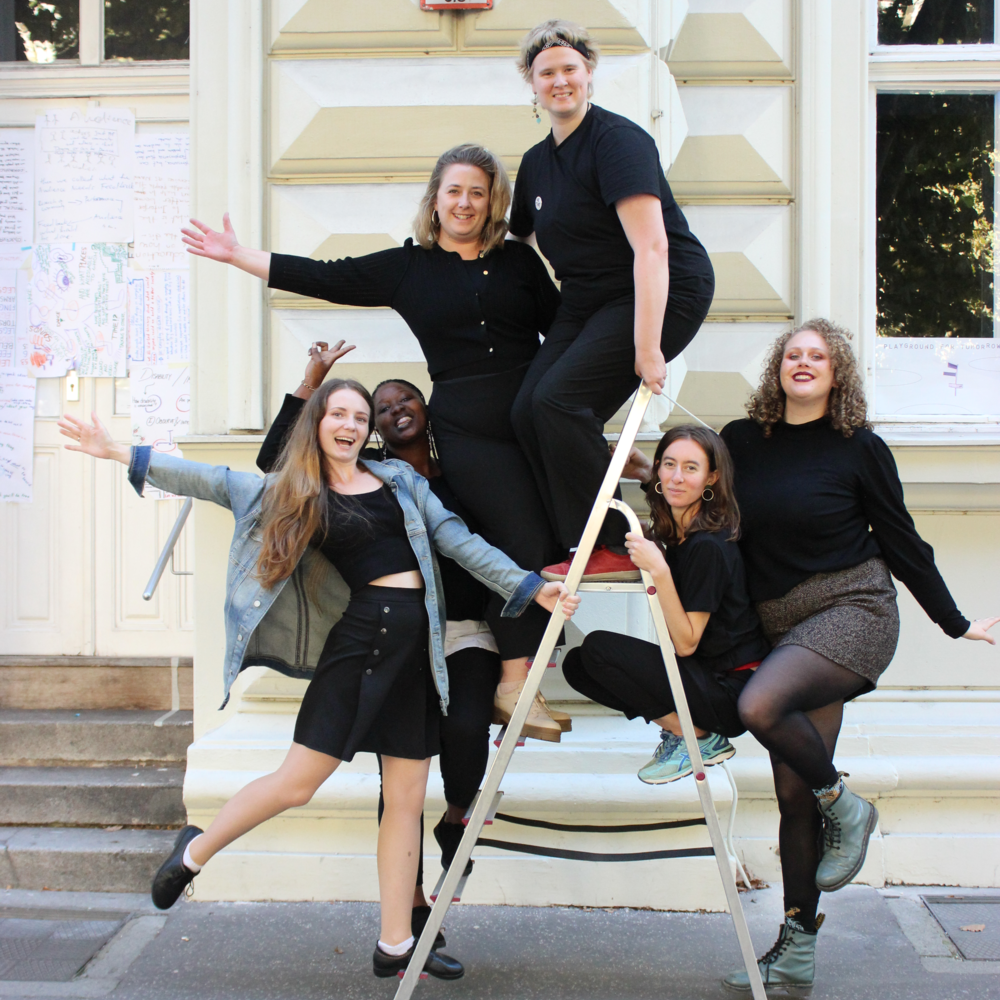
Autor*in: Sarah Hollweger
The first semester is over, huh, how time flies. Intense months lie behind us. Lots of inspiring input, passionate discussions about theatre and it’s future and many ideas transformed into practices.. You might ask yourself what exactly happened, so let’s go back to September…
For almost all of us – Nastya and Rosie hadn’t yet arrived – the semester started with a workshop dedicated to Physical Theatre led by Christian Sattlecker. Together with the first-year students of acting and directing we explored the world of neutral masks and tried to embody animals, plants, elements, material, colours … in search for the roots of physical expression and movement.
After two weeks of focus on the body, now all six of us first-year students were encouraged by Ulrike Hatzer (Head of studies, Applied Theatre) to explore Salzburg, our new and so far, unknown home for the next two years. Seeking for “(Good) People Good to Know in Salzburg”, we became familiar with folks like Gerhard (owner of the Würstelstand in front of uni), the salesperson at Motzko (= cute bookstore) or Philipp from “Studien- und Prüfungsmanagement”, who made sure we have all the important documents together.
This rather outgoing official first days, were followed by a dramaturgical course about beginnings with Christoph Lepschy. What is a beginning? What defines a beginning? Aristotle had quite a precise idea about that in his text Poetics. But what if explicit beginnings and endings are a pretty European idea? Chinese theatre, as we learnt, has a very different, or better said no, concept of starting points – life is full of continuous transformations, and so is theatre.
Next up was the Digital Soirée “Through the Borders – Spaces of Respite” in the framework of the international network PAC – Performing Arts in contexts. Within the scope of this event, organized and hosted by Applied Theatre with the support of the Institute for Equality & Gender Studies, we got introduced to the inspirational work of artists, such as Aun Helden, Dardan Hoti, The Darvish, Va-Bene Elikem Fiatsi, Paola Yo Wolff, among many great others. Strategies of resilience were shared, ways how to perform the own biography, and how to reclaim the narrative as queer artists. Additionally, the Queer*ating Team – Cat Jugravu, Tandile Mbatsha and Mike Ayvazian – acquainted us with concepts like “The Matrix of Domination” and “The 5 Phases of Decolonisation” by Poka Laenui.
From self-representation we went on to questions of representation regarding Experts of the Everyday Life with director Miriam Tscholl, who shared her practice with us. Analysing various of her works, as well as other contemporary performances, we discussed the position of experts in comparison to actors, levels of participation in rehearsal processes and the institutionalisation of expert theatre in the case of Bürgerbühne Dresden.
Following that, Judith Franke (Senior Artist, Applied Theatre) familiarised us with Accomplices and Pre-enactments through the work of Hofmann & Lindholm. Derived from their work Familie Weiss, we created our own secret settings and experienced the responsibility of being a secret keeper and accomplice. Based on the “Pyramid of Involvement“ of Norma Köhler, we learned about co-creation and debated about a paradigm shift in theatre – from the well-known ‘as if’ to a ‘what if’.
The discussion about participation was deepened with Markus Kubesch. Focused on the target group of children and adolescents, we critically assessed the common belief, that participation equals democracy. While Reinhold Tritscher from Theater ecce shared with us how inclusive theatre can be practiced and empower performers, as well as audience members.
The thematic block “On Representation – Who cares, who speaks?” was concluded by the perspective of Witnesses by Ulrike Hatzer, who hosted and curated the block, and impulses like the following: Who and what can be a witness? What is the dynamic of remembering? Which history is told? Is proof needed? What if there are no documents? Can we create new documents?
The next day, we were on our way to… DRESDEN! For four days we watched and excitedly discussed performances which were presented at the Fast Forward Festival. Additionally, we got the chance to meet with people of other institutions and were introduced to the practice of Tabea Hörnlein from TU Dresden, Tobias Rausch from Bürgerbühne Dresden and Thilo Grawe from theater junge generation.
Back in Salzburg, Heide Tömpe opened up the world of lights for us, while offering lots of hands-on advice for functioning and transparent project management. Shortly after, our next guest teacher arrived: Together with Antigone Akün we explored text development in rehearsal processes and created our own storylines collectively in a multi-step writing process.
Within the class “From Directing to Devising” we took a closer look to the practice of Samuel Beckett, Peter Brook and Augusto Boal. Examining Beckett’s scores, we were inspired to take a more ‘musical’ approach to theatre, to view theatrical settings as a composition. Brook we remember not only for his vision of theatre in The Empty Space, but also for his carpet settings, which we explored together with Ulrike Hatzer. Inspired by Boal’s Theatre of the Oppressed the group experimented with image theatre and still figures. To complete the class, the students were invited to introduce each other to theatre practitioners we worked with and were inspired by.
During this time, unfortunately some of us caught Covid, so did I. I can’t therefore write about Babafemi Folorunso’s class about “Applied Theatre and Theatreanthropology”, but my colleagues keep referring to discussions they had in this class, so I am very excited for next year’s course!
Luckily, all of us were back healthy for Olga Shparaga and Kai Ohrem’s course about “Practicing Solidarity with Imprisoned”. Looking to the crises, as Olga Shparaga called it, we discussed protest movements, namely the Belarusian revolution, the Iranian revolution, as well as the Arab Spring and protests in Ukraine. As caring and sisterhood became very central in the case of the Belarusian mass protests, we thought about care strikes, care infrastructure and asked ourselves, how does a caring democracy look like.
By that time – we have already arrived in the end of November – all of us had found a person to work with in the frame of our semester projects and introduced them in Try out I. Aside our quite packed schedule we then started to rehearse more or less regularly with our experts, knowing that soon we will have a guest from Belgium, with whom we will feedback each other’s first scenic ideas.
In the meanwhile, we explored “Short Formats – Open formats” together with Judith Franke. While learning about the history of Labor X and introducing each other to formats we have encountered so far, we created our own short / open formats. Within that, we, for example, held a lecture about intersectional feminism at Marco-Feingold-Steg in the glirring cold or made a fruit salat while reflecting the ongoing semester at our pop-up Tuesday-Café. Also, all of us had devised our own Labor X session by then – Tin focused on boundaries and saying no, Nastya arranged a Christmas Karaoke Show, whilst Alexandra and I took the tea break as an inspiration.
Eventually, Georg Weinand arrived from Belgium and introduced us to the DasArts Feedback Methods. In the frame of Try Out II, we showed scenic practices which we had developed with our expert and feedbacked each other’s work with different tools. We all went home with various lists – one focusing on elements, which worked, the other about impulses for components that are needed, lists with what-if questions, concept reflexions, tipps & tricks …. To sum it up, a lot to think about and try out.
But before we could go on Christmas holidays – a time, where all of us sought to recharge and distance a bit from the semester projects in order to come back with a fresh view, we got one last input focusing on bell hooks and critical thinking / engaged pedagogy. Inspired by her texts about sisterhood, class, and race, we developed tasks and scores to put her ideas into practice
With a clearer mind we returned in the beginning of January. Aside our weekly classes with Susanne Litschauer, with whom we work on our speaking voice in the tradition of Christine Linklater, Christian Sattlecker, who introduces us to Feldenkrais and trains our body awareness, and Mirjam Klebel, who shares choreographic strategies and exercises for movement improvisation, we finally had more time to dive in deep into our projects.
On 26th and 27th of January the day for Try Out III had come! In accordance to the topic of the term “Where do you come from? we shared what we had passionately worked on for the last weeks with a lovely audience in TIKQ:
- Lilija Tchourlina: „Haken und Öse - Aus welchem Holz bist du geschnitzt?“
- Alexandra Leonie Kronberger & Nicole Baïer: “Raise your Voice!”
- Rosemary Kilima & Maximilian Mühlenkamp: „Understanding Culture Shock“
- Nina Dalbazi & Ghila Pan: “Doing Friendship”
- Tin/Imke Bluemke & Lisa Hambrecht: “Who the hell is Kilian?!”
- Ábel Kotomán & Rosemary Kilima: “The 10th Anniversary of BINTI African Choice”
- Anastasiia Larina & Simone Seymer: “MotherMood”
- Sarah Hollweger & SMR: “smr feat sahara”
The semester ended with the so-called "Feedback Days”. We reflected our works together in the group, thought about changes we would make for a Try out IV and got feedback in single talks from all of our teachers. With an outlook on the next semester, we went into the holidays – on one side happy about the bit of off time from the ‘uni routine’, on the other hand utterly excited for what will come next!
Autor*in: Ábel Kotormán
We started the summer semester with the STÄKO (Ständige Hochschulkonferenz Spiel und Theater an deutschsprachigen Hochschulen) conference - “Whos perspective counts? Temporary strategies for decolonising one's own work practice".
Hand in hand with the Applied Theatre the working groups filled with life the spaces of AT and the stage of TIKQ - Theater im Kunstquartier: we had workshops, lecture performances and STÄKO cinema with teachers and invited guests Ielizaveta Oliinyk, Ivana Pilic, Myassa Kraitt, Anna Konjetzky and Cat Jugravu, former student of the studies.
During these days we had the opportunity to meet two STÄKO guests: Nora Amin, who shared through her story how bodies are as politics as documents. And Trace Polly Müller brought the most significant books of her artistic practice, and created a space to invite the power of vulnerability to our classrooms.
After the conference the students from the second year started to work on master projects, meanwhile the firsties (Us) occupied the big studio until the end of the semester.
Week by week we continued to discover voice and speech with Susanne Litschauer, movements & choreography strategies with Mirjam Klebel and movement, awareness, politics sensitisation with Christian Sattlecker.
We also had the series of Name Dropping events, where we heard the life-story and importance of pioneers and theater creators like Kristin Linklater, Moshé Feldenkrais and Ariane Mnouchkine as well.
The main focus of this semester is the Documentary project by Ulrike Hatzer, Claudia Heu and the second year students: Cristina Giurgea, Lilija Tchourlina, Abel Kotorman. Thanks also to Ariane Pellini for her technical assistance. We worked with the book of Nora Krug and Timothy Snyder "On Tyranny: Twenty Lessons from the Twentieth Century".
Firstly, we exchanged our own practices in reference to our common work. We, a group of five individuals of different ages, from different places, with different experiences and speaking different languages started our adventure.
We invited others to join us in our lessons, this is how we heard about leading and decision making strategies of a farm with seasonal workers, architectural plans of Salzburg or strategies of Human Resourcement at international companies. These collective processes enlarged and transformed our perceptions.
We turned the city into a field for research and exercises, theatrical work in uncertain settings, due the research project, titled “playground for tomorrow”.
I conducted workshops for the Hungarian diaspora, and the Labor X (our open programme for everyone) was conducted week by week by students, teachers and our host Andreas Steudtner.
We had eye contact, small and big talks, simple and beautiful gestures and other exercises to prepare for the times of the SommerSzene Festival. The documentary project was the second cooperation between Sommerszene and the AT launched at 21-23rd of June.
Through the journey we met inspiring and exciting individuals and groups:
The amazing artist Tobias Rausch on Interviewtechniques shared his outstanding and inspiring knowledge and skills on interview and research methods with us, not just as a theory, but through a practical session.
Nicole Baier on Documentary Film broadened our horizon on documentary works, like cinema verite and direct cinema.
Christoph Lepschy provided dramaturgical practices on Theory & Discourses and with Frank Max Müller we got to know the history of site-specifics, and site-symphatetic artworks.
In July, collegues from the 2nd year came back and showed what they worked on during the semester as their master projects:
- The Bustling Whispers from Wan Yuk Yu; Mentors: Anna Konjetzky, Georges Pfründer
- Hey Folks! from Viktória Horváth; Mentors: Kinga Szemessy, Judith Franke
- Working Borders from Johanna Mayrhofer; Mentors: Georges Pfründer, Kinga Szemessy
- Blickwinkel from Leonora Peuerböck; Mentors: Anna Konjetzky, Zuzana Ernst
Autor*in: Yuk Yu Wan
The 1st semester was very rough and tough for me, as a mature student ( 37 years old ) from Hong Kon , I have been working in theatre as an actress, teacher and also a director for 12 years, eventually I am here, In Salzburg, aimed at gaining enriching my profession and eager to challenge myself in a foreign country, or at least, I took the courage to question myself: Do I love theatre enough to pursue a better realisation of theatre? I had a question in my mind when I started my master studies here: Other than working like a machine in theatre and strive for living, how could theatre literally empower the society?
My 2nd semester began in March and ended in June, it started with an intensive March, and a long Easter holiday afterwards and ended with a documentary project performance at the end. Knowing more about documentary theatre is one of my motivation to come to this university, as I like documentary theatre wholeheartedly and I wish to know more about it. Fortunately, I am very satisfied of my 2nd semester, as I get to know how to work with a team with diverse background from different cultures. I was quite lost in my 1st semester, as a new comer to Europe, the study provided plenty of time and chances to adapt to a new working experiences and hence I found myself way more confidence to express myself. There were memorable moments to share so that you can get a glimpse of our semester: In this semester we have guest teachers giving inspiring workshops and lectures to us, they are:
In March, Ana Hofner on “Whitness as Property”, after some lectures and discourses, we had an excursion to Vienna joining the artists conference and enjoying the exhibition, that was a class which we learnt artistic research methodology too. Tobias Rausch on Interview techniques, he is an amazing artist who shared his interview techniques and research method to us, we also had some practical sessions.
In April, Nicole Baier on Documentary Film, a very inspiring class which broaden our horizon on documentary works, not only in theatre but also in film, we also did a small project on using different camera framing techniques to tell a story.
In May, Claudia Heu on “Intervention & Participation & Subversion”, we got a glimpse of being an observer or a performer in a city, just by changing our perceptions in our mind, it ended with a small audio walk tryout in Salzburg, we created and presented our work to each other. Katharina Bill on “Bodies as politics and documents”, she shared her experiences/works and thoughts with us, it raised our awareness of respecting human body and how body could also be a container of documents and how body represents in political discourse.
In June, we focused on our documentary project “Dance until we die“ as a program in Salzburg Sommerszene, with the mentoring of Kathrin Herm and Judith Franke. That was a very amazing and fascinating experience, and also an exhausted adventure with my colleagues. We worked as a collective in this project, we found a topic in Salzburg, and started our investigation, contacted people which are related to the topic and interviewed them, researched on the topic, transcribed the interviews recordings, but we also need to take the responsibility of budgeting / costumes design / looking for suitable venues for our showing / set design / set making, we took care of the production schedule, communicated with technicians, we rehearsed and we also performed on stage! We invited three acting / directing students from Ukraine to join our performing team, they are Manila Soroka, Mark Sonkin and Sofia Nimak. So eventually we devised the work together. We also have regular voice training ( by Susanna Litschauer), dance and choreography (by Mirjam Klebel) and Feldenkrais (by Christian Sattlecker).
Ulrike Hatzer and Judith Franke as our “brain“ in the study, they provided inspiring workshops and colloquiums, they provided constant consultant sessions to all of us. The semester was closed with a full day reflection session, so all the students had the chance to talk to teachers individually and get personal advises from them, I treasured it a lot as I could feel the openness of the whole study, teachers respected the individuality of students, we basically learn from each other everyday through working and discussion, exhausting but it is also fun.
I would like to sum up this semester report by an idiom from the Analects of Confucius: If three walk together, one can be my teacher. And here I want to share some of my precious moments as a short trailer for you if you are interested in this study programme:
- I got a chance to facilitate a community workshop in Lehen, I was completely out of my comfortable zone as I was in a situation that I need to work with a group which we dont have a common language to speak, but actually it worked quite well.
- I improvised with our acting team from Ukraine in the documentary project, the improvisation was amazing, my soul was completely touched by our work.
- On our premiere night, we were thinking maybe nobody will come and we may have no audiences, but eventually that was a full house (and actually more and more people came after the premiere).
- We biked to the performance venue together everyday, bringing costumes and props .
- We painted the stage set together with my colleagues
- At the end of the semester we learnt some Bollywood dance in our choreography class, we had fun and forgot all the stress we had.
- When we were stocked with our group dynamics in the documentary project, Christian was trying to inspire us in the Feldenkrais class by showing us how to take care of each other’s body, so as to find another way to work in a team.
A Reflection
Autor*in: Martin Modrý
From October to January, I spent my Erasmus semester working alongside the students and teachers of Applied Theatre. It was a blast. Arriving in Salzburg with big expectations and only a brief understanding of what it actually means to „apply” theatre, I was met with a diverse group of theatre practitioners and lovers on both the student and professor sides. We spent our first week getting to know each other, less so by talking and more by doing. While giving each other workshops and exchanging experience, the other first years and I slowly got to know the space and people of Mozarteum, as well as the beautiful, chaotic and at times very strange city of Salzburg.
Topic of the term: Practicing Resistance. An enigmatic topic that became a target for countless jokes (when early mornings became tough, one was very tempted to practice resistance against the schedule, that soon came to rule our lives), but that would become important much later. While discussing the sub-topic of Theatre & Trials, we started working on our first Devising project, by giving each other inputs and leading each session in pairs, moving forward when possible, slowing down when needed. This inward process was interspaced by outside input from our lovely voice and movement lectors (Susanne Litschauer and Mirjam Klebel) and a block seminar on Theatre Anthropology led by Dr Babafemi Folorunso.
Our bodies were thrown to space and our minds were challenged by a kaleidoscope of knowledge and perspectives only finding rest in the mundane of everyday problems: finding a good coffee shop, decently priced food and wondering why the water of Salzach is so blue (somebody told me but I forgot, it has something to do with minerals but don’t take my word for it). Getting sidetracked. At the end of the first month, we each packed all our experiences into a suitcase and set off on an excursion to Munich for a change of scenery and to see projects that were part of the Spielart Theatre Festival. What became an absolute highlight was a performance titled CRIA (Elice Ripoll, Cia Suave, go google it!) and a mad night in a certain Bar Rendezvous (don’t google it). After coming back, we spent some time talking about funding and money with Sebastian Brünger (alt. title: Money, You Hate It, but You Need It) and then jumped into a three-day workshop with Anna Konjetzky, exploring our physical biases through the ideas of Donna Harraway.
Speeding up. While this all was going on, we met weekly with Kai Ohrem, discussing how theory and philosophy impact our lives and how shifting the way we think about our surroundings can change the way we (and others) live our lives. Put briefly. Before our first showing, we first years joined Christoph Lepschy in a block seminar on dramaturgical praxis, delving into the issue of language, space and meaning. Eszter put a little plant in a glass coffee pot. It was beautiful. As the showing approached, covid restrictions started looming over our heads, so in the end, we had to do a very intimate show for our close friends and call it a day (well do be honest, after dancing my butt off as a death row prisoner three times in a row, I was more than happy that that was it #justAppliedThings).
Converting some formats to online variants showed to be challenging but at times surprisingly rewarding. Online platforms allowed us to explore the genre of cell phone theatre with the pioneer herself, Faye Kabali-Kagwa and each week we talked to different professionals (ranging from a judge to a head of a casino) about the topic of leadership. The workshops open to the public, facilitated by us and Andreas Steudtner were also transformed into online experiences and even though we all hope we longed for real human contact, it was great fun. We also got to test the methods of Augusto Boal with Ulrike Hatzer herself, which was fascinating, as we were passed on a hands-on experience from someone who worked with Boal in the past.
With the second and last showing of the semester in mind, we left for the winter holidays and after returning spent three days with Georg Weinand, who shared a method of feedback and artistic reflection developed in DasArts. From a student perspective, this was the most important input for me personally. Toward the end of the semester, my mental health started deteriorating a little bit, so the topic of Practising Resistance came to mind again. My study colleagues gave me great support and even though I spent my last weeks quarantining, thus not completing my directing output in person, I managed to create an audio piece focused on the topic of self-optimisation, self-care and society’s obsession with productivity. Even though this was my toughest period, it gave the most, not only from an artist’s perspective but as a human overall.
Applied Theatre is a cooking pot filled with phenomenal people and disruptive ideas about theatre and the ways it should be applied. This (quite lengthy) description hardly captures everything that went down over the semester. This gist of the story is, I feel very lucky to have been included with the first years, even if only for a couple of months. These couple of months required a lot of energy, but looking back I’m positive that they will be a source for many years. On a theatremaker level, on a personal level, on an emotional level. Thank you to everyone that crossed paths with me. It was an honour.
A Review of our last semester
The summer semester of 2021 was more divided for the two grades of the applied. Us, the first year students focused on collective processes, while the second year students either went on Erasmus, or spent their time preparing and presenting their master projects. The block seminars of the first months had a different atmosphere with only five people. On one hand it brought us closer; we had more space for comments and questions of each member of the group and we could all keep in mind the aspect of channeling the new knowledge into our collective documentary theatre project. On the other hand, although the meeting of the different experiences enriched the discourses, they also created ground for debates and constant negotiation of personal-professional needs and opinions. ‘Learning each other's languages’ and creating a space for fruitful compromises was a significant skill that we had acquired.
Tobias Rausch from Bürgerbühne Dresden introduced us to different interview techniques. Outside of the theoretical base for research and interview-making, we learned different questioning formats and tried our methods by recording interviews with people of Salzburg, to finally have transcripted texts and analyze our methods. We dealt with the setting and psychological situalisation of talks too, by conducting a collective life-interview with a professor. We all felt that we gained a hands-on practice that can help us approach experts for any kind of documentary project. The blockseminar of Esther Strauß on Conception as Action invited us to use the act of collecting and curating collections as an artistic practice and we got familiar with her conceptual pieces of the past years. One of her works generated intense discourses on historical remembrance and identity politics and the following conversations highly shaped the direction of the course.
As the Labor X theatre workshop sessions couldn’t yet take place in the applied studios, we have decided to take the advantage of having participants from all over the world and reflect on the constant uncertainty that is ruling our lives in the past corona-year. We designed a series of online workshops focusing on different genres of art and investigating the joy-, the pain-, the rhythms- and perspectives of not knowing and the loss of certain futures. Although the meetings through screens weren’t our prefered ways of building communities, it striked us how many people were interested in engaging weekly in the common thinking process from their homes. We also had the chance to try out the different online gaming formats that we’d developed during the past semester. Unfortunately another shorter lockdown came in our way that prolonged the Easter break. However from April on, finally we’d been permanently able to return to presence education. As a reward and as the last inputs for our collective documentary project, three inspiring and intense block seminars took place with strong physical focus. Anna Konjetzky shared a short introduction on observing the body as an archive and a document. We practiced reading objects, spaces and people from different perspectives, noticed and exaggerated our entrenched and kynetic patterns and created movement research experiments for each other. All of us look forward to her return when she’ll work with us longer next semester.
The Paper Tiger Theatre Studio from Beijing involved us in their artistic research of Kafka’s Burrow and provided us with their special approach on dramaturgy and expression through movement on stage and in public spaces. They gave us space to dig deeper in our body memories and the meaning of our bodies in improvised scenic and movement compositions. Their energy, passion, dynamics in transmitting and translating information and new philosophical approach nourished us as a collective a lot. Just as much as Claudia Heu, who coming from a martial art and social theatre background showed us her stunning long-term site specific and socially engaged projects in different countries, exhausted us with massive physical training, helped us connect body and mind and sent us for a guided performative walk to first observe then interact in public spaces with our broadened senses. She even provided us with personal consultation slots and her mind opening practices became a reference point for many of us.
Susanne Litschauer’s weekly voice classes took us on a journey of settling in our bodies and channeling our voices and texts from within to space. The main modul of the term was a collective documentary theatre project of the first year students. The research phase started in a hybrid format. Throughout the semester break in February, all of us collected topics, ideas and material on a shared online platform and we started associating around them, rephrasing them, selecting them in sessions led by us. The walls of applied studios got filled up with pictures, articles, links, books loosely connected to each other by long thought processes and red strings. We received help in forming ourselves as a collective, too.
Judith Franke’s blockseminar ‘On Collectivity’ introduced us to the work and internal structures of several collectives. We ended the seminar by defining and dividing tasks and positions while keeping in mind the strength of each person and the creative and organizational parts of artistic creation. Together with Christoph Lepschy they also provided us with readings and inputs on different types of assemblies that drew a clearer image of possible interventions, experiences and meeting spaces that we could create through the project work with the participants and audiences. Our two mentors helped to navigate among the gathered knowledge. Trace Polly Müller, (former directing student of Mozarteum, theatre maker, musician, researcher) gave an empowering input on archiving and documents, using body-mind practices, academic writings and films. She introduced us to important theories in postcolonial studies which gave a strong base to our further research, challenged and helped us to stay truthful, gentle, political and caring with our topics and collaborators. Ulrike Hatzer facilitated the channeling of the material into individual ideas and shared short concepts. She guided us on the journey of leading topic-searching sessions for each other and finally deciding on the final direction of our project: investigating the shadow history of the forced labor camp Maxglan, where 200–300 Rom*nja and Sinti*zze were imprisoned between 1940 and 1943.
Although narrowing down the spectrum of relevant topics and formats was a result of a long negotiation, finally everybody could find their own inputs and interests in the final project. In the next phase of the work (late April and May) we spent our self-organized time by finding our personal positioning and approach to our research and to fragmented biographical documents and erased histories,
-
by going to the archives to get to know more about the unmarked land where the forced labor camp used to lay and
-
by going to the fields to talk to the new owners and look for invisible imprints.
-
by gathering reading material for creating a deep understanding of the theoretical background
-
by learning from historians and descendants of survivals from the region who dedicated centuries of work to showing and unfolding the stories of Rom*nja and Sinti*zze on that very land.
-
and throughout on- and offline meetings by building up a network of fifty people and associations (artists, activists, academics, community workers and members) who are currently fighting, educating, actively remembering; defending the past and building up the future of Rom*nja and Sinti*zze in Salzburg, Austria and Central-Eastern Europe.
Unlike in imagined theatre processes, a long time was passing by with “office work”, uncovering layers and narratives of history. The plan was to build a bridge between past and present. A performative book, a community garden, an earth procession were all considered and rejected ideas. Throughout late spring, several other university-related programs and projects broke the flow of the work but also gave us new methods and directions of thinking.
The Glossary Conference Salzburg invited international professionals of performing arts in context to share and investigate dynamic practices and static terms of their work and to found a network (PAC) and working groups until the next conferences to come. Previously to that, the Applied Theatre students were also involved in the Walking Terms project where alternative ways of creating a glossary of diverse practices were established through shared online walks with professionals and students from all over the globe. We also got a chance to go for an excursion to the Camping Campus of Supergau Festival in the outskirts of Salzburg. The weeklong event was a meeting space for young artists doing experimental and interdisciplinary research on spatial as well as social spaces to interrogate the duality of countryside and city. There we managed to get out of our heads, listen to concerts and lectures, see the possibilities of applying theories to hands-on working methods, build and rebuild ideas and structures, to look closer to the soil as a material of remembrance, nature and historicity and we also trained our surviving skills in the cold and rain. The outdoor workshop series, Theater LaborX: Echoes of the Soil was designed here as well.
Coming back to the city, we were left with only one month to finish our project. After so many talks, readings, meetings and workshops, the final concept of Als Alle Ohre hören konnten was born: a participatory audio installation consisting of several letters written and spoken by our collaborators, resounding from the ground of Maxglan, creating a temporary memorial and a space for discussions, marking the actual territory of the forced labor camp and defending the dead of the past by carrying their memory into the present and future.
Alongside our mentors we spent days and nights and on the field, getting permissions to the territory in Maxglan, finding technical solutions for the installation, editing material to share, to inform, and to promote, organizing the opening of the installation, an open talk with invited guests and the vigil on midsummer night… but mostly to collect letters: to talk again one by one to our collaborators, and guide them through the process of addressing their ancestors. Devising this project wasn’t only technical but very emotional: sharing the findings of the research, the radical rethinking and rearranging of the past with care, breaking the invisibility of the events on the field and finally filling it up with fifty voices of strong and devoted people in the name of active remembrance. Standing there next to the Glan at the end of June, seeing hundreds of visitors leaning close to the ground to listen to forgotten histories of the soil and engage in dialogue was a huge reward of the work and of the second semester. Following the vigil and the open talk, further ideas came up from local organizations to make these stories permanently visible in different artistic, urban and social contexts. We hope and plan to elaborate the project by creating a framework that can be applied to the local context of several places, where hidden histories need to be addressed by living communities.
Covid-19 und Applied Theatre
Autor*in: Armela Madreiter
Das letzte Sommersemester war noch nicht richtig in die Gänge gekommen, wir waren noch damit beschäftigt langsam aus der leichten Untätigkeit der Ferien zu kriechen als Mitte März 2020 der erste Lockdown in Österreich ausgerufen wurde. Nach ein paar Tagen Schockstarre, in denen wir als Studierende aber auch alle unsere Dozierenden, versuchten, mit der Situation zurecht zu kommen und diese abzuschätzen, versammelten wir uns vor dem Bildschirmen. Hatten wir früher Videocalls maximal für Kontakt mit unerreichbaren Freund*innen im Ausland verwendet, wurden sie nun Alltag. Wir müssen das Beste aus der Situation machen, das stand fest.
So begannen wir unseren Choreographieunterricht bei Mirjam Klebel mit der Aufgabe, Orte in unseren Wohnungen zu finden, an denen wir noch nicht waren. Es entstand eine Reihe wunderbarer Bilder von uns in unalltäglich verrenkten Posen. Auch gestalteten wir kleine Audiowalks durch unsere Wohnräume. Bei Christian Sattlecker bauten wir eigene Masken und begaben uns mit ihnen auf literarische Ausflüge. Susanne Litschauer saß uns auf dem Bildschirm gegenüber und arbeitete trotz manchmal krachender Mikrofone unermüdlich an unseren Stimmen. Unsere Recherchearbeit bei Ulrike Hatzer wurde in den digitalen Raum verlegt - wir befragten Kollektive, die wir ansonsten getroffen hätte nun einfach telefonisch nach ihren Arbeitsmethoden und präsentierten die Ergebnissen anschließend in kleinen Präsentationen. Der reguläre Unterricht spielte sich nach einiger Zeit ganz gut ein. (So gut sich eben praktischer Theaterunterricht online gestalten lässt). Nur das Sommerprojekt im Modul kollektives Arbeiten stellte uns vor eine große Herausforderung - waren unsere bisherigen, konzeptionellen Ansätze doch so gar nicht auf eine globale Pandemie zugeschnitten gewesen.
Mitte Mai kehrten wir unter strengen Covid-19 Auflagen zum Präsenzunterricht zurück - trotzdem saß die Pandemie der Stadt und uns nach wie vor in den Knochen und im Nacken. Nichtsdestotrotz erarbeiteten wir im Kollektiv und mit Unterstützung von Christine Umpfenbach und Christoph Lepschy das Stadtprojekt MEGA:STAGE Salzburg - ein Supermarkt der Geschichten. Diesen eröffneten wir Ende Juli 2020.
A Review of Our Last Semester
The first semester of our applied theatre master program was quite a journey. After a series of diverse and fun on- and offline entrance examinations we had only a few weeks to get prepared for our new lives in this controversial Austrian city, for the intensive learning and creating opportunities that our studies offer. On our welcome days we had the chance to get familiar with the teaching methods of our main lecturers in the frame of short workshops, and us, students also had to show interactive insights to our expertise.
It was indeed promising to see that on the top of the dramaturgical-, corporal-, choreographic-, vocal-, pedagogical-, theatrical approaches that our professors offer us, we’d be able to profit from the wide range of previous studies and experiences that gather in the spacious applied studios. (The nine students of the first and second year are coming from the fields of literature, theatre studies, psychology, music, physical theatre, costume and stage design, LGBTQ performance making, theatre in education and political sciences). The title of the first semester ‘Flying University - where to find and where to bring the stories that feed me’ invited us to learn about and experiment with the theatricality of spaces and places. We dived into a series of inspiring inputs that drained and recharged our batteries on a loop while many of us were still also busy with settling in our new homes, finishing up the registration and getting to know the place and the study-collegues.
Ulrike Hatzer’s weekly lessons and city walks pointed towards the topic of mapping – unmapping leaving us with collections of unconventional maps and counter-cartographies, concepts of different spaces by Elias and Lefebvre, as well as practical examples, ideas and concepts of interventions in public spaces. The warmup sessions of senior artist Judith Franke trained us to formulate open questions and interrogate our environment in theory and action. We had a lot of fun playing games and getting challenged by different exercises in the studio and later in our rooms.
Christian Sattlecker raised our consciousness with the physical approach of the Feldenkrais method and helped us to slow down and pay attention to the inner spaces which was utterly necessery for processing the huge theoretical input of other classes. The preparation with Andreas Steudtner for holding drama workshops of Theater Labor X started by reading about theater pedagogy and devising practices and planning small workshops for each other. On the edge of the lockdown we still experimented with voice exercises in Mirabellgarten hoping for real live sessions with participants. On our first block seminar with Dr. Margit Schild we learnt about improvisation as an interdisciplinary field and a spontaneous social action and we tried to create the framework of it by small public interventions tackling problems of the invisible design of the city. We covered the trashbins in questions and golden foil to drag attention to hiding issues of Salzburg, we planted advertisment trees for bring attention to the work of independent and socially engaged associations, we created nonbinary-gender toilets in the main building of Mozarteum and even opened an imaginary mensa for the students.
Dr. Babafemi Folorunso - our first native English speaking lecturer - challenged our minds with the fundamental notions and main authors of performance theory and we had heated discussions about semiotics, reception theory, applied theatre, phenomenology, subjectivity, postcolonial- and feminist theory. During the months of autumn a lot of physical and theoretical spaces opened up through the seminars and inputs of our curriculum while the actual places were closing one after the other due to the upcoming second lockdown. In these strange circumstances we began to start our own research leading to our first try-out projects and to apply theories in practice while following the ever-changing corona restrictions. From November on, only individual lessons and solo studio-work were allowed, all other activities moved to digital platforms however we stayed in the city for finishing our projects and help each other in the research, or just share screens and time during and after the online lectures.
Through the screens we investigated gender issues and body politics with Dr. Andrea Zimmermann and the directing students, using the complex texts of Judith Butler and bell hooks to unfold the concepts of subversion and appropriation of the norms. Christoph Lepschy’s dramaturgy seminar drifted us to the realm of utopias and heterotopias, connecting Foucault’s concept ‘Of Other Spaces’ to a site specific performance in Taipei and heterotopic places of Salzburg. The regular practical group work was challenged by the lockdown and as a consequence, got substituted by individual, online or theoretical alternatives. Miriam Klebel’s online dance classes invited us to develop movements in our rooms, to get lost in the city, to create, to record and to exchange our small site-specific choreographies which was highly needed after so much sitting, thinking and conceptualizing. The online Labor X sessions with participants made us research about exercises designed for digital spaces. The lack of previous offline interactions wasn’t ideal for building trust and commitment in a group so we kept looking forward to the hoped live meetings in the summer semester.
Hatzer and Judith Franke offered us a series of close reading sessions of Michel de Certeau’s Practice of Everyday Life. On the top of thought generating discourses, we planned itineraries in the city for each other that helped to observe and co-create spaces through the perspective of the text. The biggest loss of the pandemic was our excursion to the Fast Forward young director’s festival in Dresden. As compensation we watched the mixture of two online theatre festivals and saw innovative examples of contemporary and participatory projects and the usage of digital media. With our seminars during the day and the performances in the evening it was an exhausting week however we had fun in the student-lead ‘online bars’ which were the platform of post-show discussion and trial of facilitating applied entertainment.
Our first solo project tryouts ended up in an exciting joint installation in the studio in December. The space got cut into nine equal corners for every one of us, so we could work distanced and separated during the lockdown. By going there alone several times weekly we could witness the development of the other corners and interact with our collegues’ projects by rearranging or leaving hints on their territories. The studio slowly got filled up with the imprints of our topics, fragments of our research and documentations of our tryouts in the city spaces. The showcasing of these spaces made it possible for the viewers to not only look at finished artistic results but dive into the working process of each mind, hence getting a general overview of the skills and interests of the group. The feedback session with our colleagues and professors led to several new ideas and opened the way to our second theme, The Experts of Everyday Life.
------------------------------
After the showing of the first try-out everybody felt exhausted and happily relieved. Although we jumped into the next topic without a break and with a small overlap of the seminars, it was refreshing to start thinking-processes from another angle - from the point of view of the Expert. As preparation for our second tryouts the main terms of expert theatre were distributed among us so we researched and held presentations about witnesses, accomplices, co-researchers, community actors, participants, target groups and spectactors. Our professors also provided us with an almost unprocessable amount of online inputs that showed a wide range of working methods and artistic outcomes of expert theatre projects.
Sebastian Brünger brought a rich line of examples of Rimini Protokoll performances and others that staged nonprofessional actors, their stories or expertise. Tobias Rausch gave an overview of possible research formats and interview techniques. Miriam Tscholl summarized European perspectives of participatory techniques and the role of facilitators through her works at Dresden Bürgerbühne and by questioning the connection between art and social work through productions of Our Stage Festival. She even offered short personal mentoring talks about our expert tryouts in process.
Starting to work with our experts in January was again held back by the extended restrictions. Many of us dealt with it by choosing persons they already have known or formats not requiring physical presence -- both of which turned out to be just as much of a challenge as of an ease. However the privileged exception of art universities allowed us to have contact lessons again which made the experience of the past month more lively and intense. On our iconoclasm and applied theory course with Kai Ohrem the history of monuments and the reflection on public remembrance opened thoughtful brainstorms. Through a city-walk we investigated the nazi past of statues in public spaces and got quite insipred to plan artistic interventions around them and continue the discourse on our regular lectures of applied theory in the summer semester. Christoph Lepschy’s dramaturgy practice introduced several styles of historic and contemporary biographical texts. Inspired by it, many beautiful texts were written by us connecting real and imaginary life stories to objects. Frank Müller’s and prof. Ulrike Hatzer’s seminar on researched based work made us see and question the subaltern history and the life of infamous men in Woyzeck’s struggles.
Getting familiar with the Das Arts feedback method by Georg Weinand was a huge change in perspective on how to evaluate and contribute to each other's works in progress and how to work forward with the affirmation and constructive criticism on our visions and concepts. Working without the colleagues of the second year created a differently intimate atmosphere for opening up, taking the studio space and sharing material with each other. In the pedagogy-psychology workshop Judith Franke explored with us the special chances and challenges that come with a young or even very young audience. Dancing live in groups and individually with Mirjam Klebel brought us to a better understanding of our bodies and offered hands on strategies of generating movement and choreography with nonprofessionals. The huge dreamed dinner with all our experts after the showings of our tryouts still couldn’t take place in the study - instead we needed to watch some of our colleagues’ works through screens from different rooms. But somehow with our performances, participatory formats, videos and audio installations we still managed to gather in the studio space a lot of different knowledge and personalities from all around the world.
As a joint ending and beginning, the second year students are starting their master projects and we first years have already started to prepare for our collective documentary theatre project in the summer semester by investigating the terms of “groupwork”, “ensemble” and “document” and looking out for topics and problems laying on the streets, in the archives and around the communities of Salzburg.
Auf in die Semesterferien
Autor*in: Kim Groneweg
Das erste Semester ist geschafft! Wie Ihr vermutlich wisst, vergeht die Zeit in einem intensiven Strudel an Aktivitäten sehr schnell, sodass ich jetzt erst dazu gekommen bin, diesen zweiten Blogeintrag zu verfassen. Es ging aufregend daher: Am 6. Dezember haben wir mit diversen Redebeiträgen, Performances, Lesungen, Open Classes und zwei Dancefloors unsere Räume eröffnet und einen grandiosen Einstieg gefeiert. Einige Freund*innen, Mitstudierende und Dozierende haben uns schon im Vorfeld unterstützt und gemeinsam mit weiteren Interessierten und Bekannten haben wir einen schönen Abend verbracht.
Eine Woche später fand das erste Zeigen unserer Eigenprojekte statt: Die Zuschauer*innen konnten Salzburg im Rahmen eines Audiowalks aus einer anderen Perspektive wahrnehmen oder auf einer der Probebühnen unseres Studiums in die Ängste eines Gürteltiers eintauchen. Im Theater im Kunstquartier wurde die vermeintliche Dichotomie von klassischer, nahezu „zarter“ Musik und der Grobheit des bäuerlichen Alltags aufgelöst und in einer Performance mit anschließender Installation die Möglichkeit geboten, sich mit dem Zusammenhang von Feminismus und Klimawandel auseinanderzusetzen.
Im Januar gingen wir nach einem produktiven Feedback noch einmal an die Projekte heran, arbeiteten sie technisch, dramaturgisch oder konzeptionell aus, sodass beim zweiten Zeigen von Armela und Leonie zum Beispiel weitere Performer*innen auf der Bühne standen als noch im Monat zuvor. Ich denke, wir Student*innen haben eine Menge in Bezug auf Arbeitsstrukturen, Anforderungen an sich selbst und von außen, Zeitmanagement und Kommunikation mit Mitwirkenden gelernt, aber auch an welche künstlerischen, professionellen und persönlichen Grenzen wir hin und wieder stoßen. Neben der Vorbereitung unserer Eigenprojekten fanden einige Seminare weiterhin regelmäßig wöchentlich statt: Wir gewöhnten uns zunehmend an die Anleitung des Theaterlabors X und bekamen somit eine gewisse Leichtigkeit darin.
In der „Angewandten Theorie“ gingen wir vertieft den Fragen nach, wer wann und wie spricht, in welchen Gesellschaftsformen wir leben und wie sich dies historisch entwickelt hat – Gilles Deleuze und Donna Haraway sind hier nur zwei Schlagworte. Christian Sattleckers Seminar zum Feldenkrais wurde abgelöst von Susanne Litschauer, die mit uns ein Stimmtraining basierend auf Kristin Linklater durchführte. Dies stellte ein hohes Bewusstsein für Körper und Stimmer her und half uns insbesondere beim Zeigen für unsere Bühnenpräsenz. Zusätzlich dazu nahmen wir an Blockseminaren teil. Im November hatten wir in einer Woche gleich zweimal Besuch von Gastdozent*innen: Zuerst lernten wir in einem Seminar mit dem Belgier Georg Weinand neue Feedbackformaten kennen. Im Seminar zeigten wir uns vorherige künstlerische Arbeiten voneinander und konnten uns zudem passendes Feedback auf die aktuellen Arbeitsprozesse geben.
Silke Merzhäuser und Julia Roesler von der werkgruppe2 aus Braunschweig brachten uns Formen des Dokumentartheaters und Interviewstrategien näher. In diesem Seminar sind Kurzperformances entstanden, die sich mit dem gemeinsam ausgewählten Überthema „Körper“ beschäftigten und am Ende des Wochenendes zunächst im internen Rahmen aufgeführt wurden. Die Arbeit mit Silke und Jule hat uns immens für unseren Studienprozess geholfen: So wurden die Performances beispielsweise beim ersten Zeigen eigenständig noch einmal aufgeführt oder aber Teile davon nutzbar für die Eigenprojekte. Zum Ende des Semesters hatten wir ein spannendes, theoretisches Seminar bei Sheri Avraham in Bezug auf politische Kunst. In diesem beleuchteten wir den Begriff der Utopie in der Kunst und lernten auf der anderen Seite, anhand des Textes „The Undercommons – Fugitive Planning & Black Study“ gegebene Strukturen an Universitäten zu hinterfragen und zu unterlaufen. Sheri hat uns zudem eine Kurzeinführung in die Grundlagen von Photoshop gegeben, welches uns beispielsweise für die Gestaltung von Flyern nützlich werden kann. Mit unserer Studienleiterin Ulrike Hatzer nahmen wir uns das Theater von Augusto Boal vor. In theoretischer und praktischer Auseinandersetzung drangen wir innerhalb von zwei Tagen an den Kern eines persönlichen Konflikts vor und erkannten aufgrund der theatralen Methode eine mögliche Problemlösung.
Autor*in: Kim Groneweg
Seit nun etwas mehr als einem Monat studiere ich „Applied Theatre – künstlerische Theaterpraxis und Gesellschaft“ an der Universität Mozarteum und habe in dieser kurzen Zeit schon an vielen tollen Seminaren und Workshops teilnehmen dürfen. In diesem neuen und ersten Jahrgang sind wir vier Student*innen, wodurch die Studienatmosphäre eine angenehme und intensive ist. Von Vorteil ist, dass wir durch diese Größe in einem sehr engen Austausch miteinander und auch mit unseren Dozent*innen stehen und aktiv den Studienrahmen mitgestalten können.
Noch vor dem Semester hatten wir die Möglichkeit mit den Schauspielstudent*innen aus dem ersten Jahrgang an dem Kurs „Neutrale Maske“ bei Christian Sattlecker teilzunehmen. Dadurch bekamen wir einen spannenden, praktischen Einblick in die Methode nach Jacques Lecoq und lernten zudem schnell die anderen Student*innen des Thomas Bernhard Instituts kennen. Bei Christian haben wir Applied-Theatre-Student*innen weiterhin wöchentlich einen Kurs, in dem wir uns praktisch mit Methoden aus dem Feldenkrais auseinandersetzen. Jeden Morgen beginnen mit einem Warm-Up bei Sheri Avraham, um unseren Körper wachzurütteln und Warm-Up-Ideen für eigene Anleitungsprozesse zu bekommen. Ein Highlight des Studiums stellt das Theaterlabor X dar, in dem wir unter der Begleitung des Dozenten Andreas Steudtner mit Theaterbegeisterten jeglichen Alters jeden Dienstagabend zusammenkommen und künstlerische Ideen ausprobieren.
Wir haben überdies Seminare zum „Devising Theatre“ bei Ulrike Hatzer, zur „Dramaturgischen Praxis“ bei Christoph Lepschy und zur „Angewandten Theorie“ bei Kai Ohrem. Diese Kurse nützen uns insbesondere für unsere Eigenprojekte, da wir uns auf verschiedenen Ebenen mit Anfangs- und Leitungsfragen auseinandersetzen. Momentan stecken wir in der Konzeptions- und Durchführungsphase für unsere Projekte, im Dezember wird es dann ein kleines Showing geben. Inhaltlich werden wir vier Student*innen sehr unterschiedliche Themen behandeln, die vom Queerfeminismus über die vermeintliche Stadt-Land-Dichotomie bis hin zum Klimawandel und zur Angst reichen. Wir führen die Projekte zwar einzeln durch und suchen uns die Performer*innen selbst, erhalten aber super Unterstützung durch unsere Studienleiterin Ulrike Hatzer und haben durch die Infrastruktur des Mozarteums freien Zugang zu Technik, Material und Räumen, die wir für die Realisierung der Projekte benötigen.
Da unser Studium international ausgerichtet ist, werden Kurse von Gastdozent*innen angeboten, die in englischer Sprache stattfinden. Mit dem Theaterwissenschaftler Babafemi Folorunso von der University of Scotland haben wir uns in einem dreitägigen Blockseminar mit der Theateranthropologie und postkolonialen Theorien beschäftigt. Diese Theorien sind für die Entwicklung des gegenwärtigen Theaters essenziell, sodass es großartig war, mit diesem Seminar in das Studium einzusteigen. Vor zwei Wochen haben wir an einem Tanzworkshop bei Annika Tudeer teilgenommen. Annika ist Mitglied in dem finnischen Performancekollektiv Oblivia und hat diesen Workshop im Rahmen des tanz_hous festivals in der ARGEkultur angeboten. Wir haben die „Do-What-You-Saw“-Methode kennengelernt, die das Kollektiv entwickelt hat.
- Dr. Babafemi Folorunso (Performancetheory)
- Silke Merzhäuser & Julia Rösler (Recherche & Text)
- Christine Umpfenbach (Rechercheproject)
- Georg Weinand (Feedbackformats)
- Anna Konjetzky (Choreographie)
- Andreas Steudtner (Anleitungspraxis)
- Dr. Margit Schild (Intervention in Public Spaces and everyday life)
- Miriam Tscholl (European Perspectives on Participatory Theatre)
- Tobias Rausch (Interview Techniques/Strategies)
- Sebastian Brünger (On Experts/On Application)
- Paper Tiger (Body-Text-Composition)
- Esther Strauss (Concepts and/as action)
- Claudia Heu (Body and Memory)
- Faye Kabali-Kagwa (Cell Phone Theatre)
- Andreas Bürgisser
- Kathrin Yvonne Bigler
- Betty Chen
- Georges Pfründer
- Katrin Herm
- Trace Poly Müller
- Katharina Bill (Body as Document)
- Nicole Baier (Documentary Film)
- Sonja Prlic
- Heide Tömpe
- Beata-Anna Schmutz
- Christina Bauernfeind
- Markus Kubesch
- Martín Valdés-Stauber
- Olga Shparaga
- Barbara Lubich
- Margit Schild
- Kinga Szemessy (Mentor:in, Artistic Writing)
- Martina Fladerer (Mentor*in, IE WIssenschaft & Kunst)
- Azadeh Ganjeh (Mentror*in)
- Lisa Lucassen (Mentor*in)
- Ariane Pellini (Soundtechnik)
- Arthur Zgubic (Gast)
- Simone Seymer (Gast)
- Olli Hangl (Gast)
- Mustafa Durgut (Gast)
- Maryna Yakubovich (Lektorin Schauspiel Thomas Bernhard Institut)
- Heide Tömpe
- Christine Neuner (Pädagogik)
- Dr. Anita Moser (Wissenschaft & Kunst)
- Ana Hoffner (Artistic Research)
